2024
- Visitation by Master of Biomedical Sciences Program of UI
- Development Infection Biobank of Microbiology Department FMPHN UGM
- Biorepository Preparation of Balai Besar Labkesmas Jakarta
- Visitation and consultation by Head of INA-RESPOND Tangerang
- Visitation by 2023th Students of Doctoral Program FMPHN UGM
- GCLP-Based Sample Management Audit in Biobank FMPHN UGM
- Visitation by Prof. Ganesan Karthikeyan from All India Institute of Medical Sciences, New Delhi, India : International Research Collaboration Opportunities
- Visit of Prof. Martina Micheletti from University College London
- Visit of Prof. Jason Swedlow from Molecular Cell and Developmental Biology dari School of Life Sciences, University of Dundee, Skotlandia
- National Biobank Workshop 9th : Infection Biobank
- Visiting Professor Precision Medicine in Colorectal Cancer
- Development of sample management system for Infection Biobank of Microbiology Department FMPHN UGM
- National Biobank Workshop 9th : Infection Biobank
- 10×10 Virtual Biobank Network with University of Colorado
National Biobank Workshop 9th: Infection Biobank
National Biobank Workshop 9th: Infection Biobank was successfully held on November 24-26, 2024 at FMPHN UGM. This event was held as a commitment from Biobank FMPHN UGM, Microbiology Department of FMPHN UGM, and UGM Academic Hospital to increase research capacity of infectious diseases through biobank management with international standards.
The workshop was held for 3 days and attended by 32 participants from 22 different institutions, including research institutions, hospitals, and universities. The speakers included international biobank experts such as Zisis Kozlakidis, Ph.D (WHO IARC, Lyon) and Dr. Cheong Io Hong (Shanghai Jiao Tong University), as well as teams from the Biobank FK-KMK UGM and the Department of Microbiology FK-KMK UGM
- Biobank’s MOOC Video of “Aspek Etik dalam Praktik Biobank”
- Biobank’s MOOC Video of “Bagaimana Cara Mendirikan Biobank”
- Biobank’s MOOC Video of “Best Practices Infrastruktur dan Fasilitas Biobank”
Biobank FMPHN UGM also contributes to brave learning through eLOK UGM (e-Learning Open for Knowledge Sharing) and UGM Online. This brave learning aims to compile internal and external training materials on the collection and management of quality biospecimens by using ELOK and UGM Online as a medium for exchanging training materials. The materials are in the form of modules, videos, and participant evaluations aimed at forming a good understanding related to the technical and non-technical aspects of biospecimen collection. The Newest Biobank FMPHN UGM’s MOOC is MOOC 3. Pengembangan Materi Biobank untuk Riset Kesehatan di Indonesia.
2023
IT GRANT 2023 (Building a biobank training center: Adding modules and providing training)
Biobank is a new concept in health research in Indonesia. The biobank’s scope of work includes technical (systematic, long-term collection, transportation and storage of biospecimens) and non-technical (ethical, legal and social) aspects. The Biobank Unit, apart from managing infrastructure services, also has an educational capacity at the national level which is held through the eLOK platform, the YouTube channel, as well as the Biobank website which can be accessed nationally.
In 2021, using class B IT Grant funds, educational material has been prepared in the form of complete modules, and 12 videos related to basic biobank concepts, sample management, data management and an introduction to the SIMBIOX application (Biobank Management Information System). This material is available on eLOK and the Biobank YouTube channel. The material in the form of videos can be accessed by students, the AHS network, researchers inside and outside UGM, and is part of the national biobank training material for health research in Indonesia, which is routinely held every year at UGM.
This year we are trying to complete educational materials in the form of technical modules and videos aimed at students, researchers and laboratory technical implementers starting from sample collection to direct practical destruction (wet lab). It is hoped that this material will become a reference in independent training and those held by Biobank FMPHN UGM.
RISPRO LPDP Grant
Output:
- Revision of Academic Paper and Writing of Draft Government Regulations
- IPR Registration and Scientific Publications
- Infographics of Hospital-Based Biobank Modeling
- Infographics of Academic Paper
- Dissemination and Evaluation of Hospital-Based Biobank Modeling
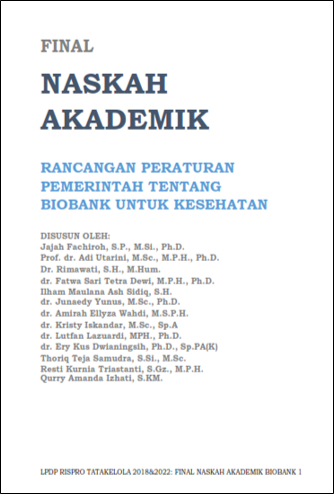
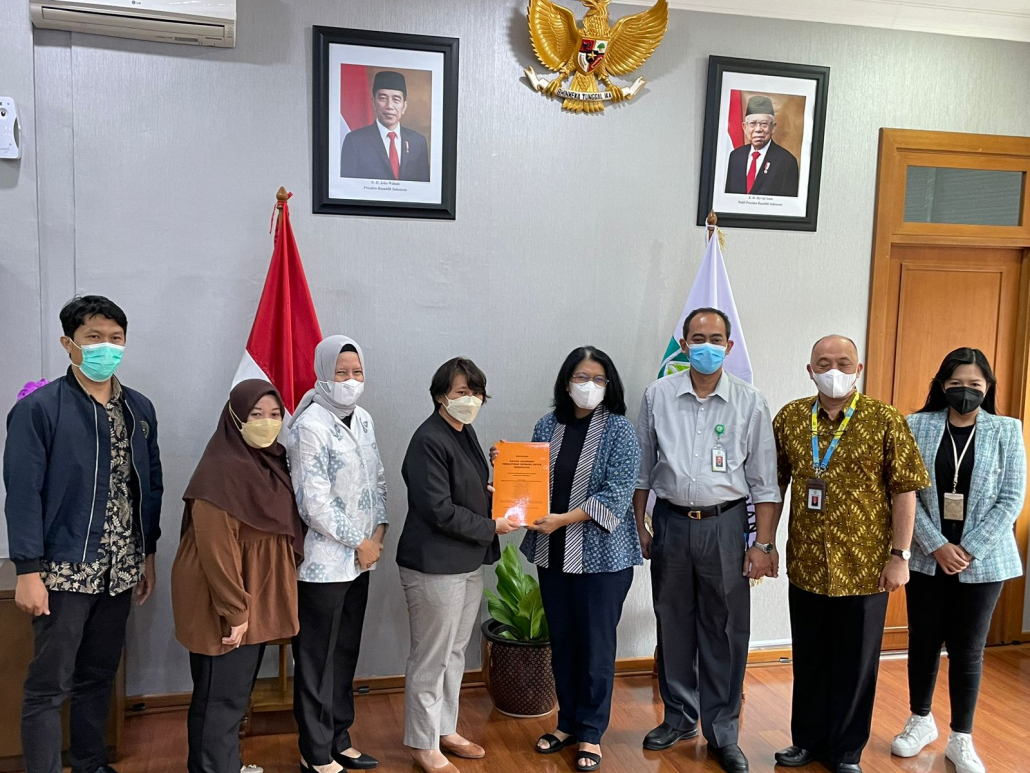
Submission of the final academic paper to the Indonesian Ministry of Health
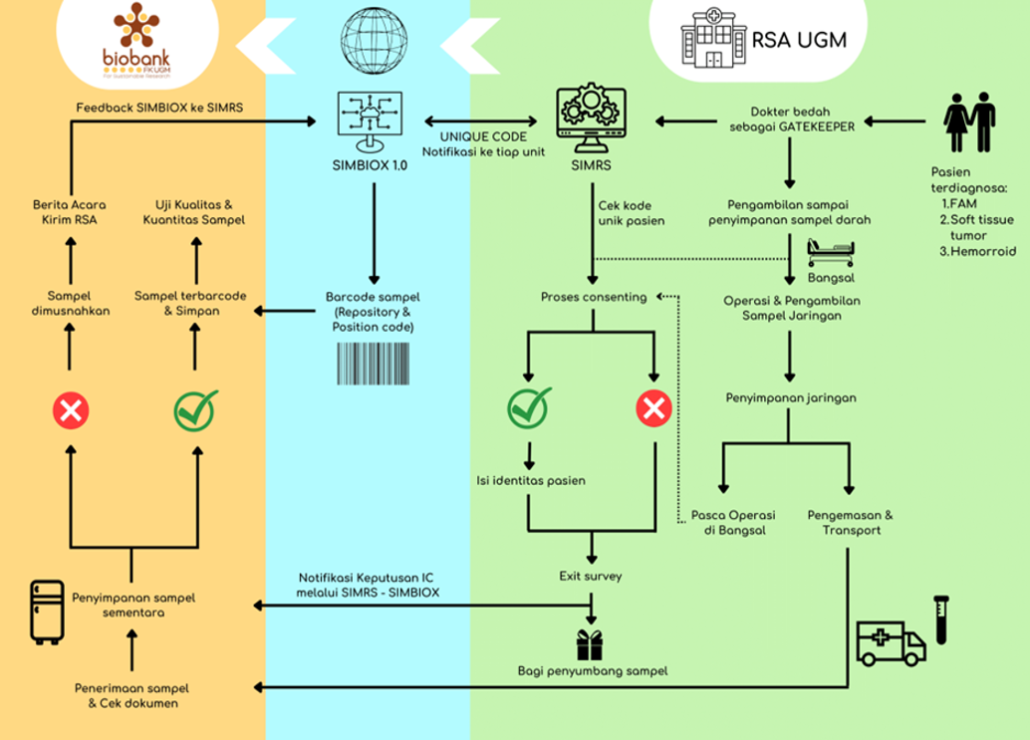
Flowchart Biobank Modelling in RSA UGM
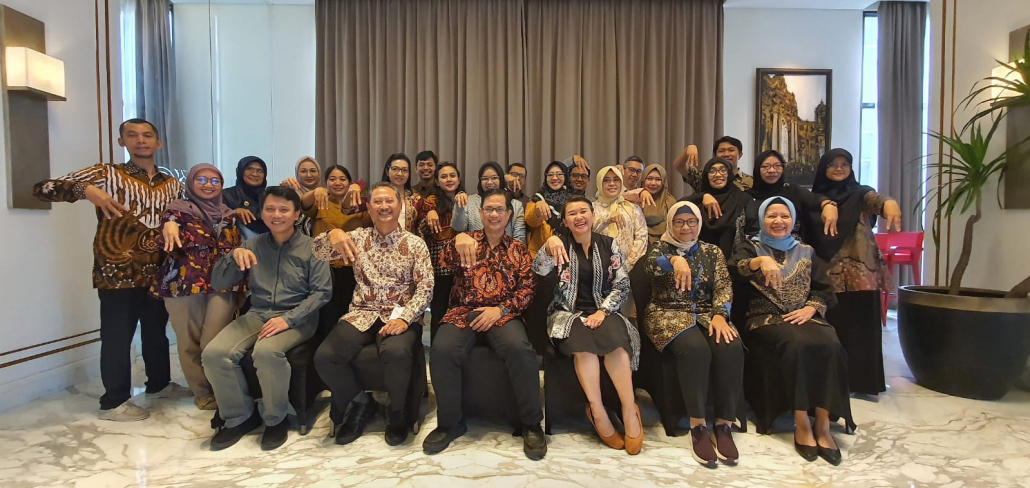
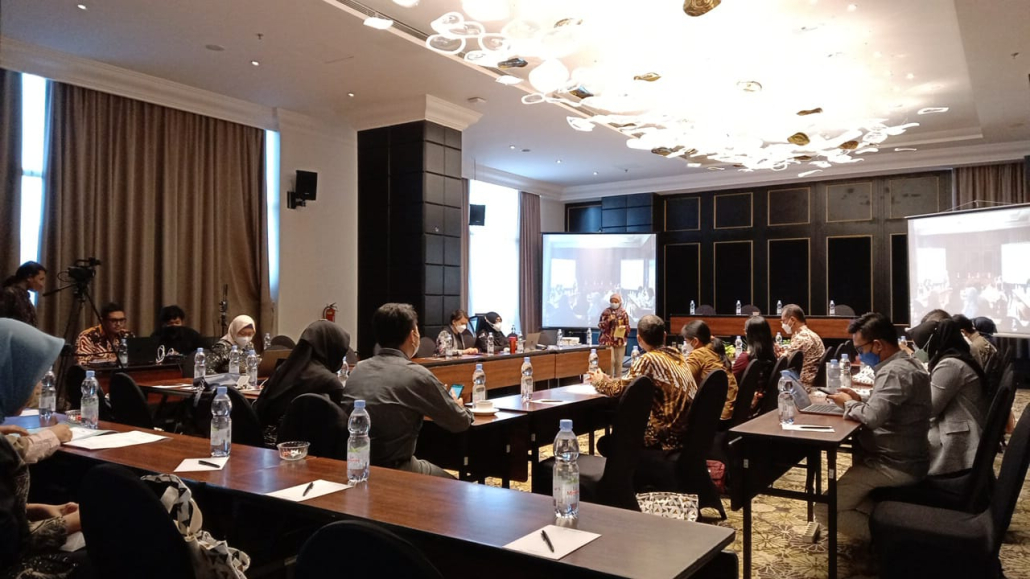 Dissemination and Evaluation of Modeling held in a hybrid method
Dissemination and Evaluation of Modeling held in a hybrid method
Increasing Human Resources Capacity
- Basic Training for Laboratory Technician by UGM on March 2023(Efri Kurniawan)
- Participation in the Biobank 101 Workshop held by ISBER on April 2023 (F. Linda Tri P and Efri Kurniawan)
- ChatGPT and Canva Integration Training for 32JP Online Learning Media on May 2023 ( F. Linda Tri P and Efri Kurniawan)
- Participation in the 2023 Information Technology Based Course Development Grant Workshop on May 2023 (F. Linda Tri P and Efri Kurniawan)
- PBMC isolation training (F. Linda Tri P and Efri Kurniawan)
- Tips for Maintaining Safe Computer Use (F. Linda Tri P and Efri Kurniawan)
- Physical Activity in the Work Environment to Increase Productivity (F. Linda Tri P and Efri Kurniawan)
- Biosafety and Biosecurity Trainning (Efri Kurniawan)
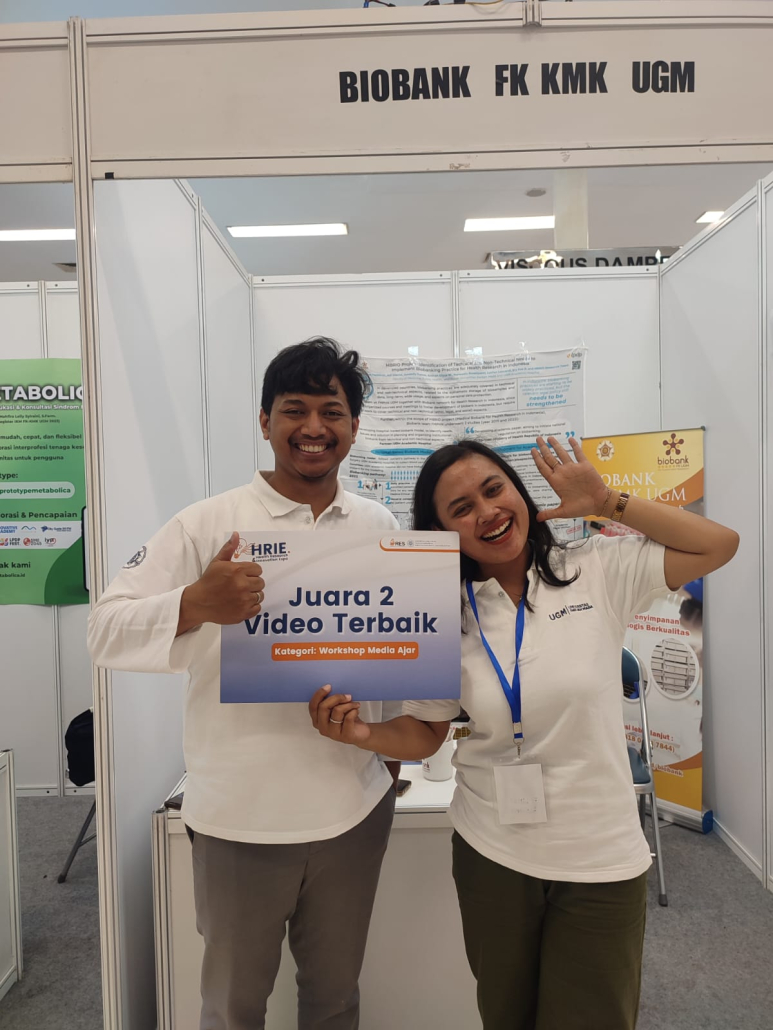
2nd place winner in the teaching materials video category
Biobank Collaboration 2023
- Biobank technical advisor at BGSi (Jajah Fachiroh)
- Development of data management system (Simbiox) 2.1 (Ministry of Health-Sisfomedika) for use in biobank hubs and central BGSi
- Collaborator for multimorbidity research development (GCRF funding)
- Collaboration on the Use of SIMBIOX with the Indonesian Ministry of Health’s DTO (SIMBIOX is one of the basic systems used by BGSi)
- Collaboration with various biobank SOPs with the Ministry of Health
- Collaboration with PT Sisfomedika for the development of SIMBIOX 2.0
- Workshop on using SIMBIOX for the Ministry of Health’s Vertical Hospital
- Public health laboratory collaboration as an external biorespository expert (Jajah Fachiroh)
- Public health laboratory training resource person (Ery K. Dwianingsih)
- Making an educational video of Informed Consent for the Indonesian Health Survey (Survey Kesehatan Indonesia) Study
Biobank Visitation
In 2023, biobank received visits from various institutions.

Accreditation of DV specialist medical education programs
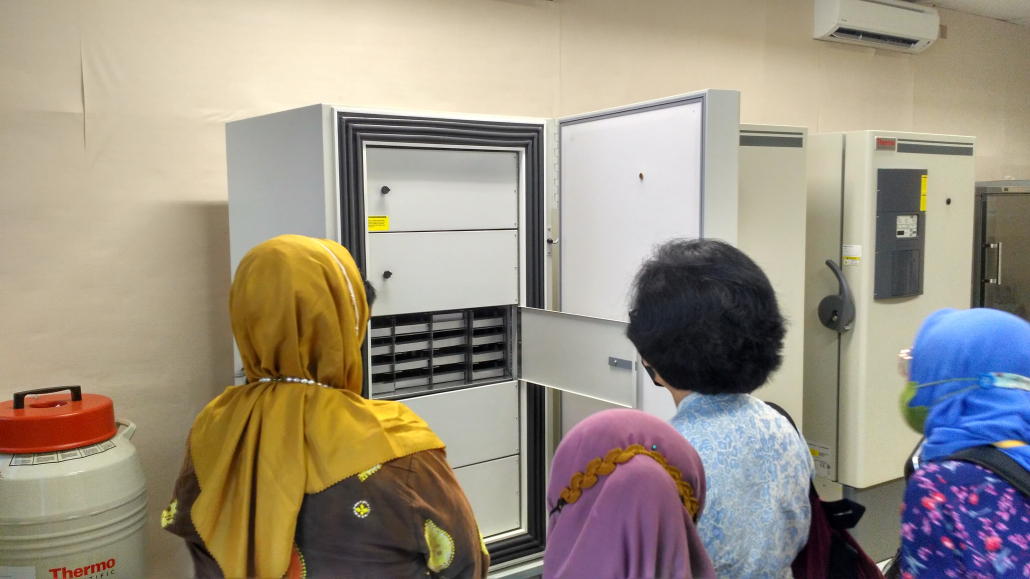
Visitation from Divine Study
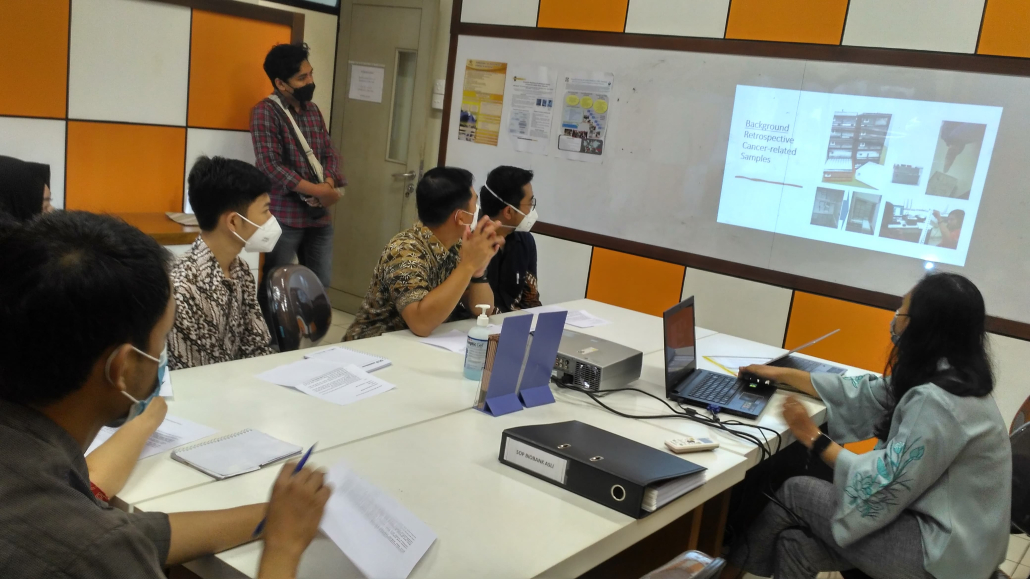
GCLP Doctoral Study Program
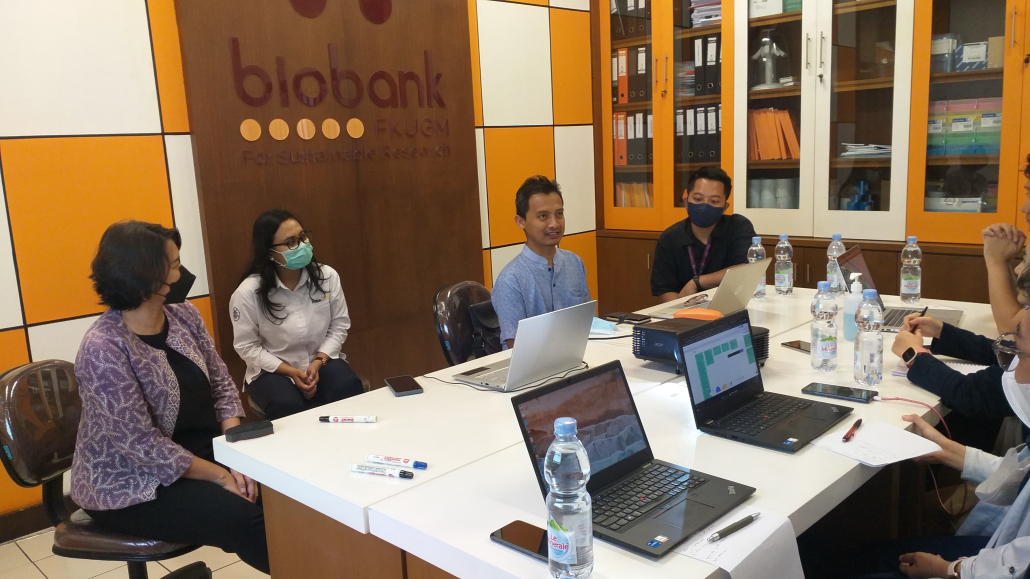
Facility visit and data management along with samples from BGSi
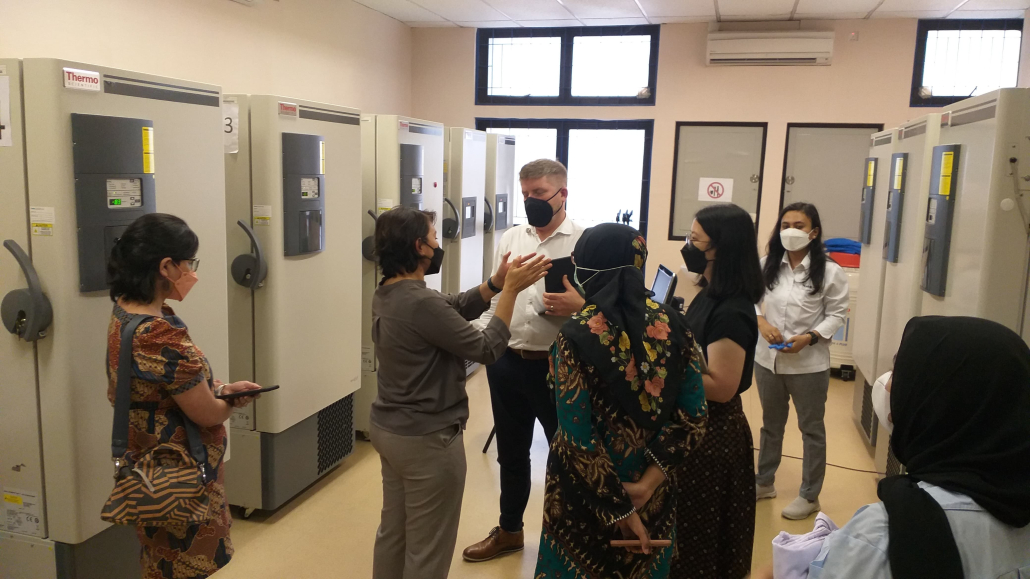
Visitation from BGSi
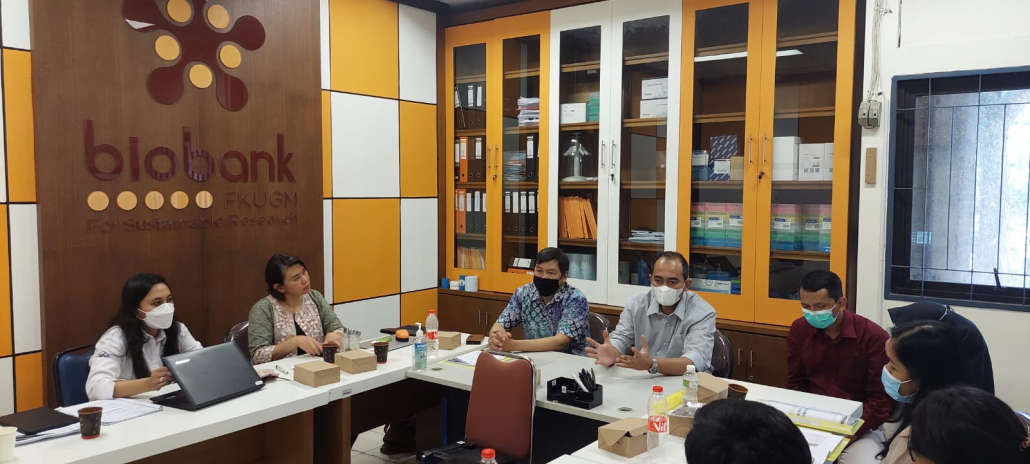
Trainning for BKPK Ministry of Health
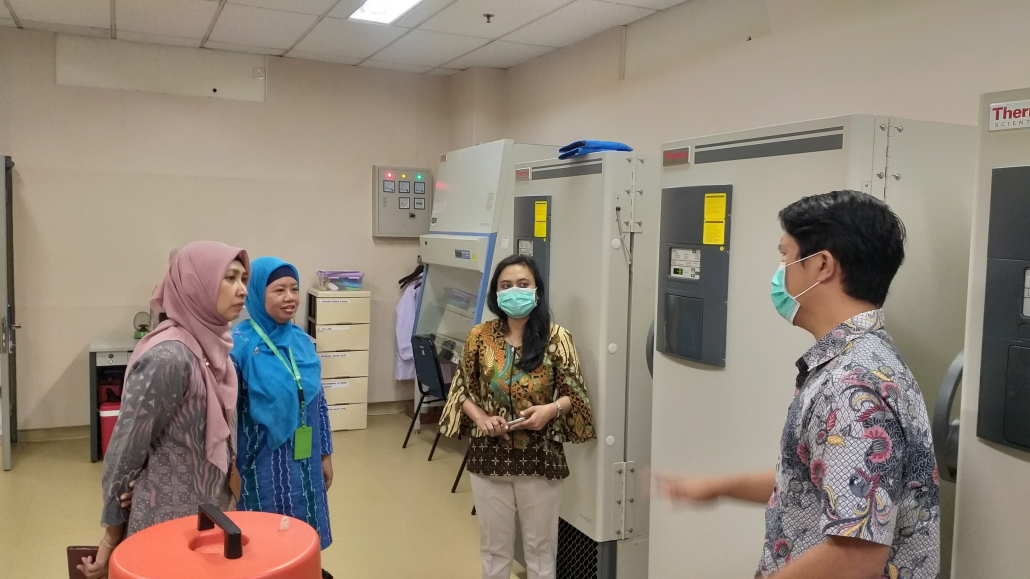
Visitation from BKPK Ministry of Health
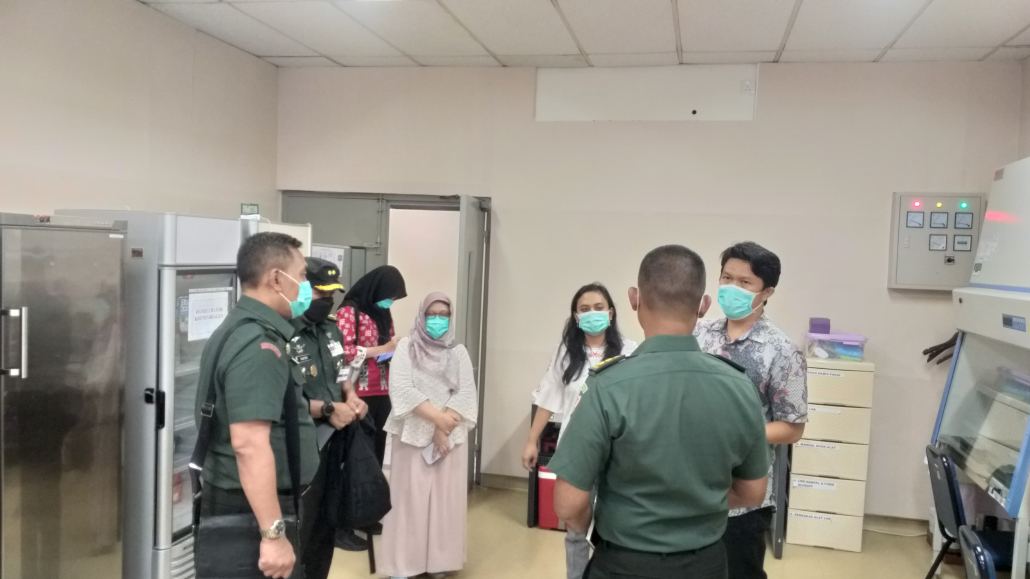
Visit from the Indonesian Army for cooperation plans
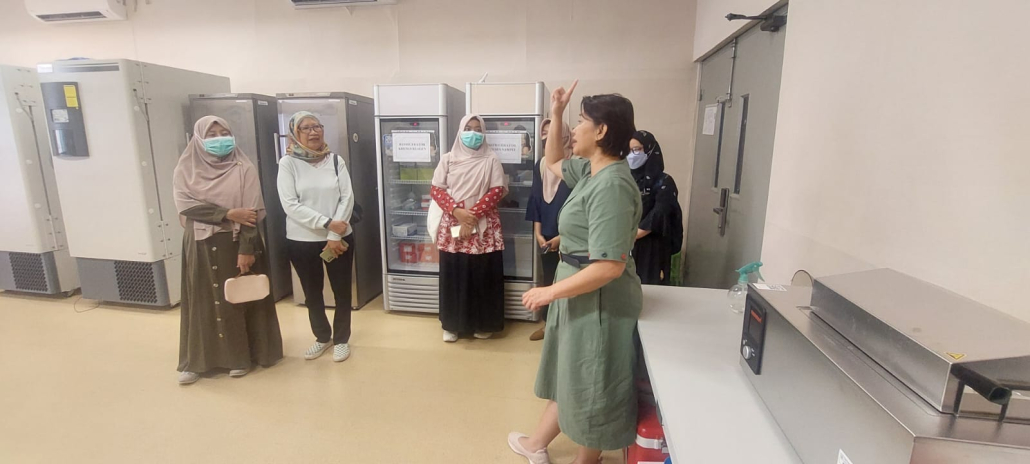
Visitation from BRIN
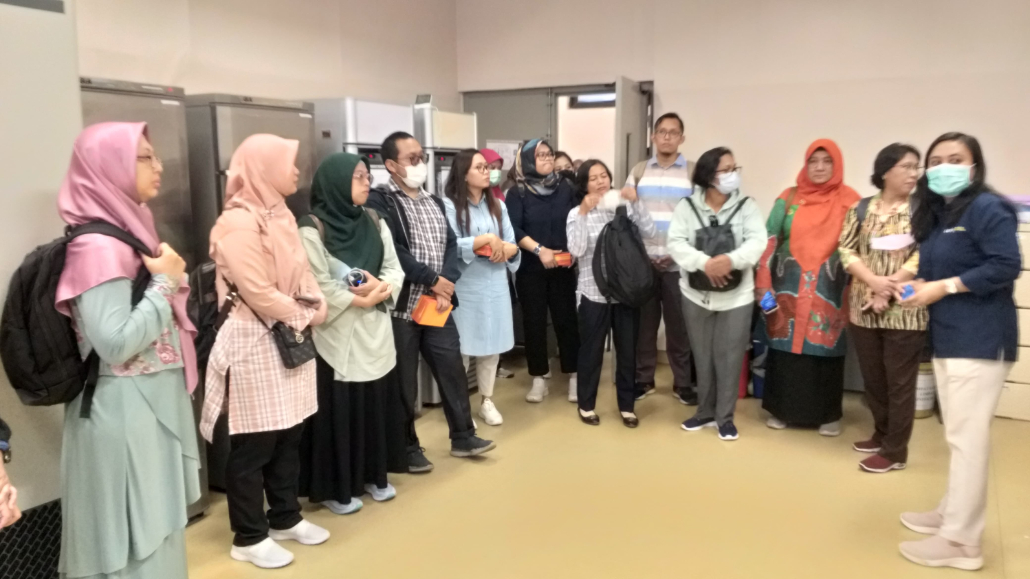
Doctoral study program orientation

Visitation form UNESCO
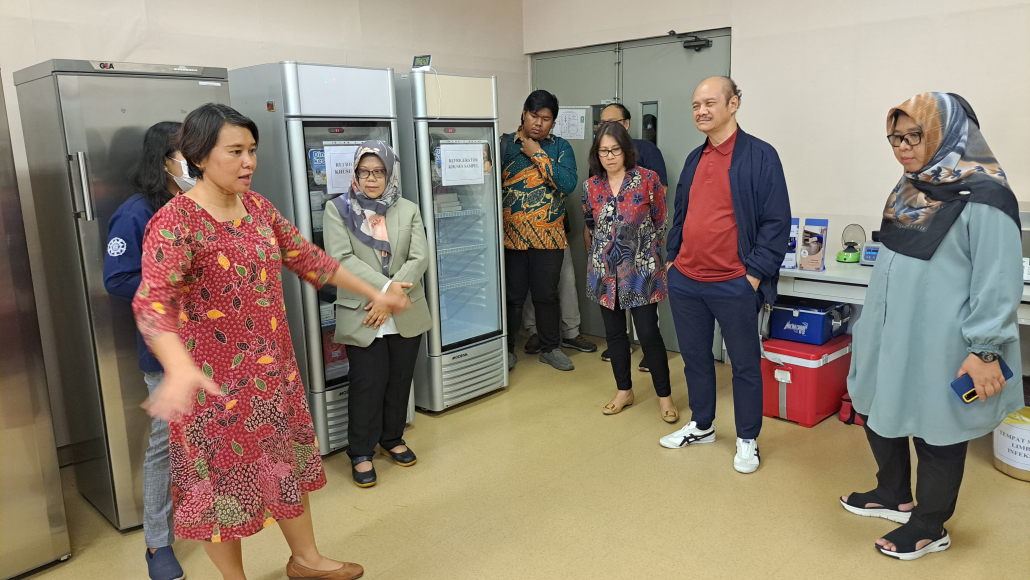
Visitation Program Pusat Unggulan Antar Perguruan Tinggi (PUAPT) was held Direktorat Jenderal Pendidikan Tknggi dan Teknologi, Ministry of Research, Culture, and Technology
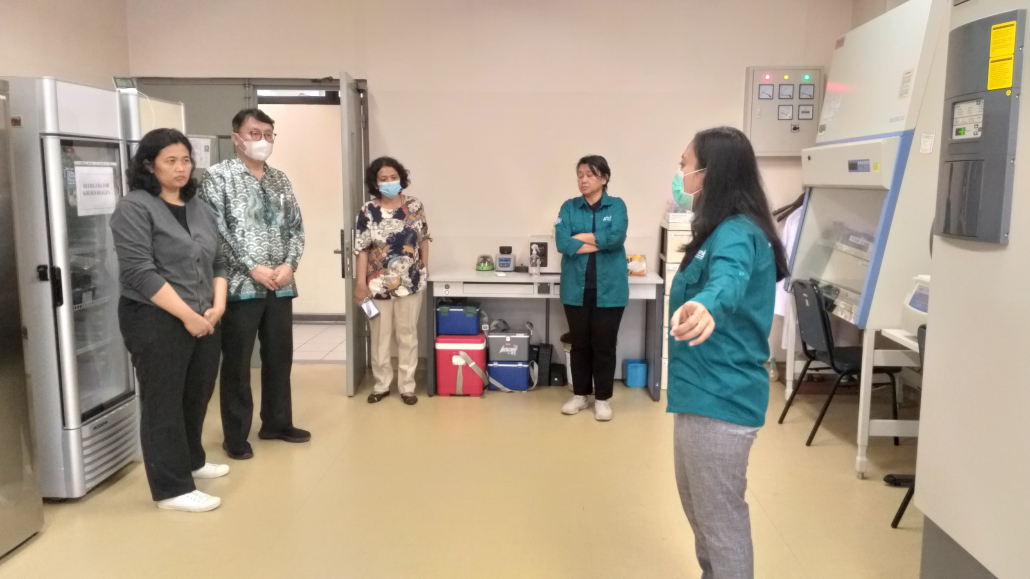
Copy study of Balai Vektor Salatiga
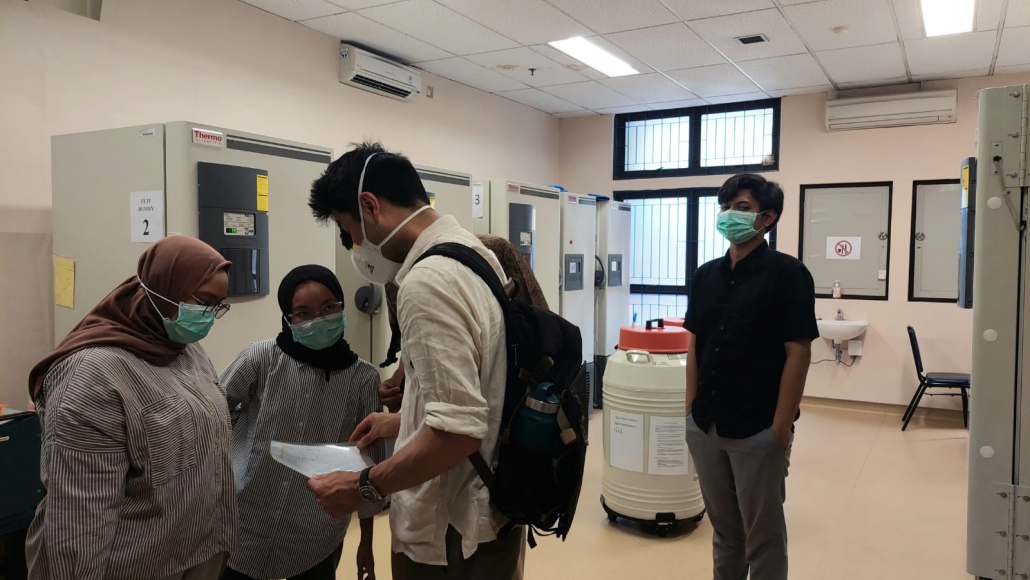
Visitation from Zero TB Study
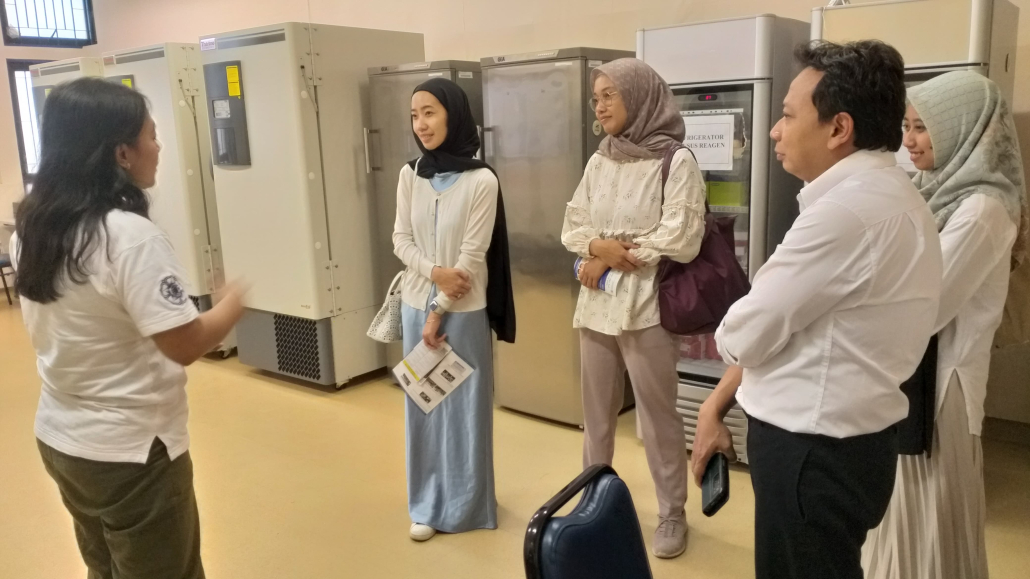
Visitation from SIMKES study program
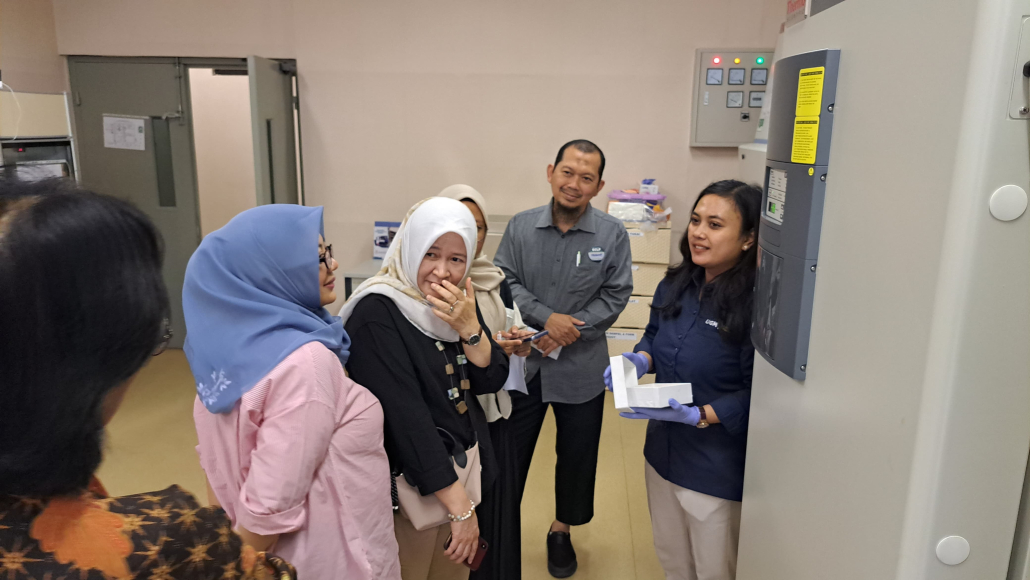
Visitation from GCLP participants
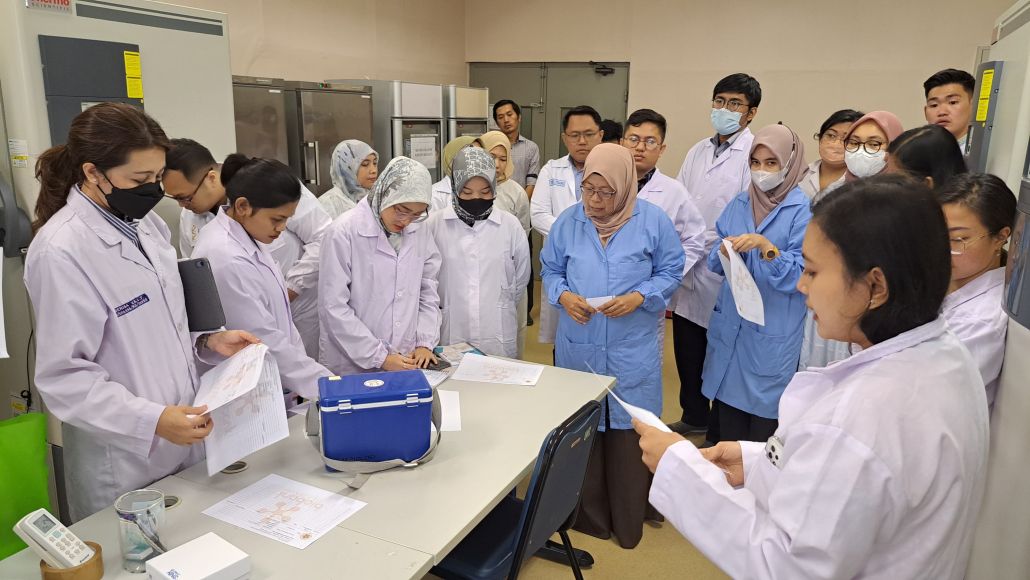
National Workshop Biobank
Intellectual Property Rights 2023
- Profil Biobank
- What is Biobank?
- Proses Pengelolaan Sampel
- Isolasi Plasma dan Buffycoat
- Manajemen Data
- Aplikasi Sistem Manajemen Data Biobank SIMBIOX
- Simbiox untuk Data Manager
- Simbiox untuk Teknisi Laboratorium
ISBER 2023
The ISBER annual meeting has been the premier event in biobanking education for over 20 years and is the only truly global event in biobanking. Year after year, ISBER brings together new and returning biobankers from 6 continents, providing opportunities for academia, industry, and pharma to learn, connect, discuss, and collaborate which was held on May 3-6 2023 in Seattle, USA.
Publication 2023
In preparation of 2 manuscripts related to biobank ethics and modeling (data from the grant LPDP RISPRO study)
BEST PRACTICES IN BIOBANK
Biobank is a facility or organization that collects, stores, and manages human biological samples, such as blood, tissue, urine, and DNA, as well as related health data. The main goal of biobank is to support scientific research in a variety of fields, including biomedicine, genetics, epidemiology, and drug development. Biobank operations to date are guided by best practices. To enrich knowledge related to daily biobank operations, Biobank FMPHN UGM held National Biobank Workshop VIII: Best Practices in Biobank
On November 27-29 2023. Material presented are:
- Biobank Concept
- Best Practices in facilities and infrastructure for long-term sample management and storage
- Best Practices for Sample Management Quality
- Universal precautions for long-term sample collection and storage
- Best Practices for Data Management Biobank
- Theory and Practice of Sample Management in Biobank
- Theory and Practice of Using SIMBIOX 1.1
- Theory and Practice of Sample Storage Quality Control
- Biobank governance and business processes
- Ethics in Organizing Biobank
- Informed Consent in Biobank
Learning is delivered in a way
- Asynchronous: participants access learning materials one week before the activity via https://elok.ugm.ac.id/
- Synchronous
a. Providing materials and discussion in class
b. Sample management practice in the laboratory
c. Practice data management using SIMBIOX 1.1.
The workshop was attended by 23 participants from 12 institutions (BGSi, RS Pusat Infeksi Sulianti Saroso, RS Kanker Dharmais, RS PON, RSAB Harapan Kita, RS Jantung dan Pembuluh Darah Harapan Kita, RS Sardjito. RS Ngoerah, RS Persahabatan, BKPK, Universitas YARSI, RS Siloam).
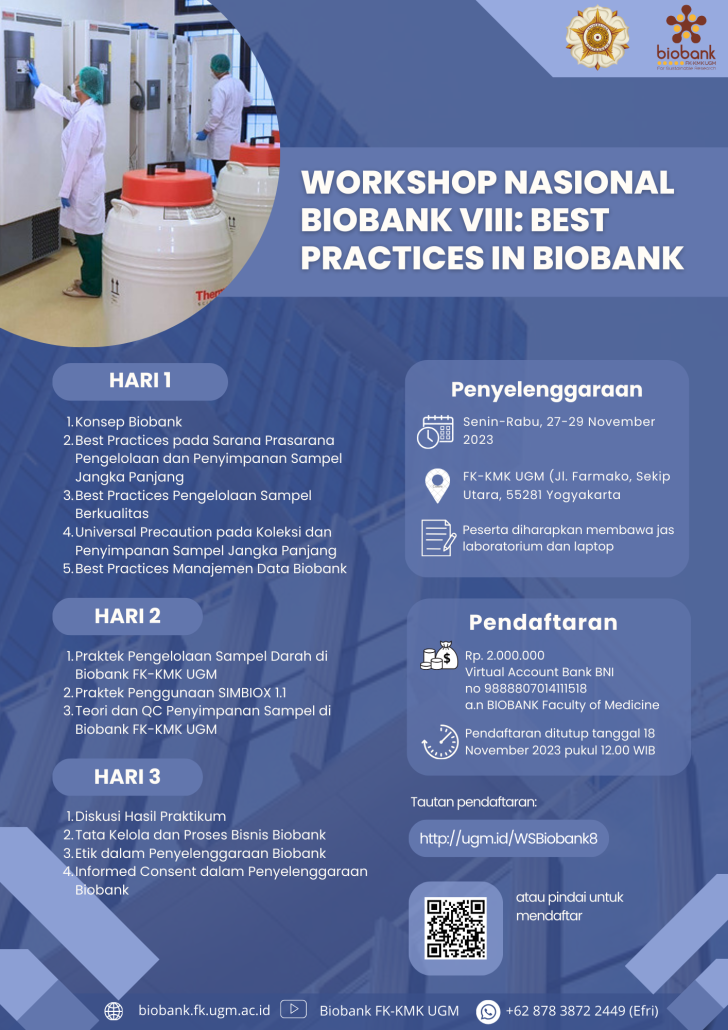
Flyer National Workshop Biobank

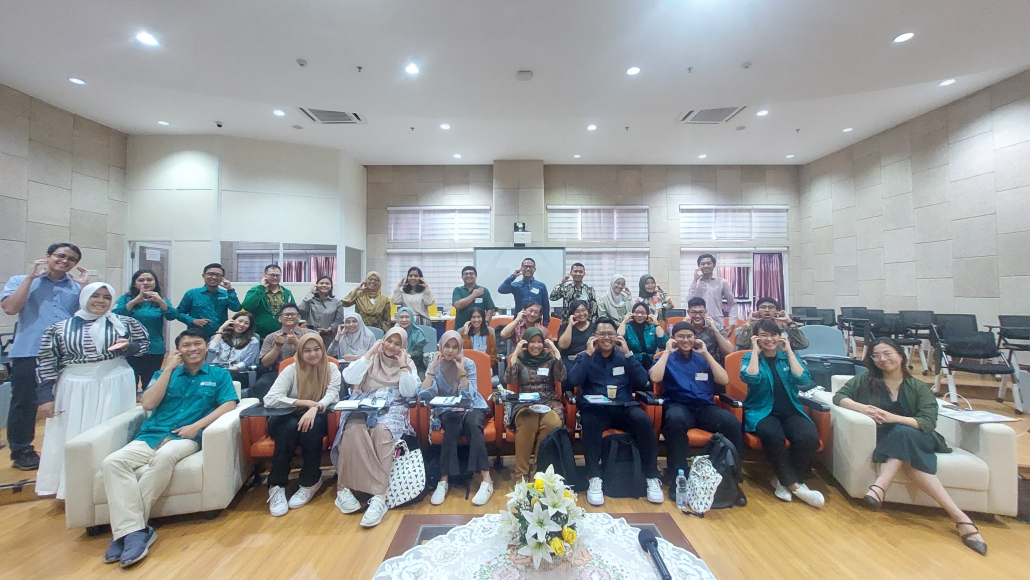
National Workshop Participants
BIOBANK TECHNICAL TRAINING
In an effort to provide precision medical services to the public, the Ministry of Health officially launched the Biomedical & Genome Science Initiative (BGSi). BGSi is the first national initiative program created by the Minister of Health Budi Gunadi Sadikin to develop more appropriate treatment for the community. The method is to rely on technology to collect genetic information (genome) from humans and pathogens such as viruses and bacteria or what can be called Whole Genome Sequencing (WGS). Through BGSi, the WGS method will be used for research into the development of treatments for six main disease categories, namely cancer, infectious diseases, brain and neurodegenerative diseases, metabolic diseases, genetic disorders and aging. In its implementation, BGSi is carried out in nine vertical hospitals, RSUPN Cipto Mangunkusumo, RS Pusat Otak Nasional Mahar Mardjono, RSPI Sulianto Saroso, RSUP Persahabatan, RS Kanker Dharmais, RSUP Sardjito, RS Prof I.G.N.G. Ngoerah, RS Anak dan Bunda Harapan Kita, dan RS Jantung Harapan Kita. The Health Policy Development Agency of the Ministry of Health of the Republic of Indonesia (BKPK Kemenkes RI) is operationally involved as a center for storing biospecimen reserves from nine hospitals and distributing them for WGS in the Eijkman building and to third parties in the future.
In developed countries, clinical and population-based biobank facilities have become an integral part of supporting research and clinical services, but in developing countries like Indonesia, biobanks are something new. The initiation of the BGSi central biobank at BKPK is expected to be carried out in a structured manner based on optimizing existing facilities and infrastructure, including human resources. Following up on this matter, the Indonesian Ministry of Health’s BKPK collaborated with Biobank FMPHN UGM to organize a BGSi Central Biobank Technical Training Workshop. The training was held on 26-27 June 2023 and is specifically designed to answer the needs of the BGSi Central Biobank.
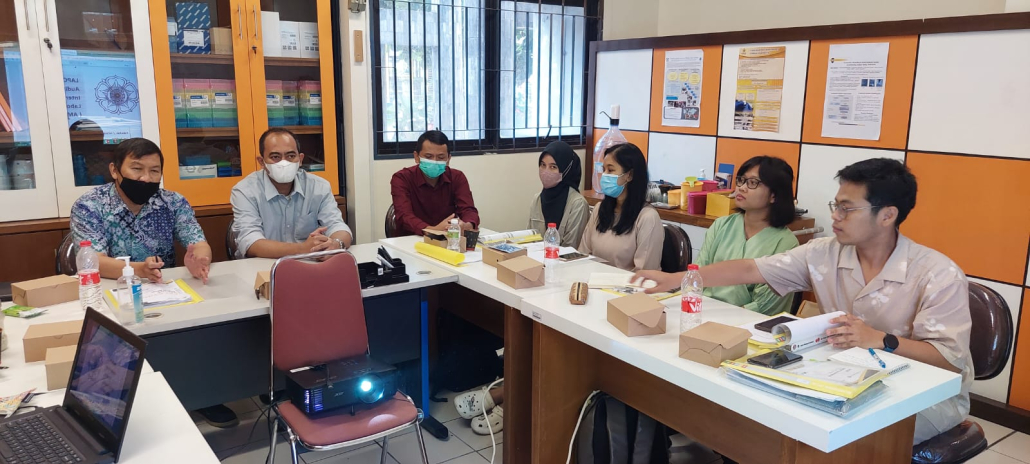
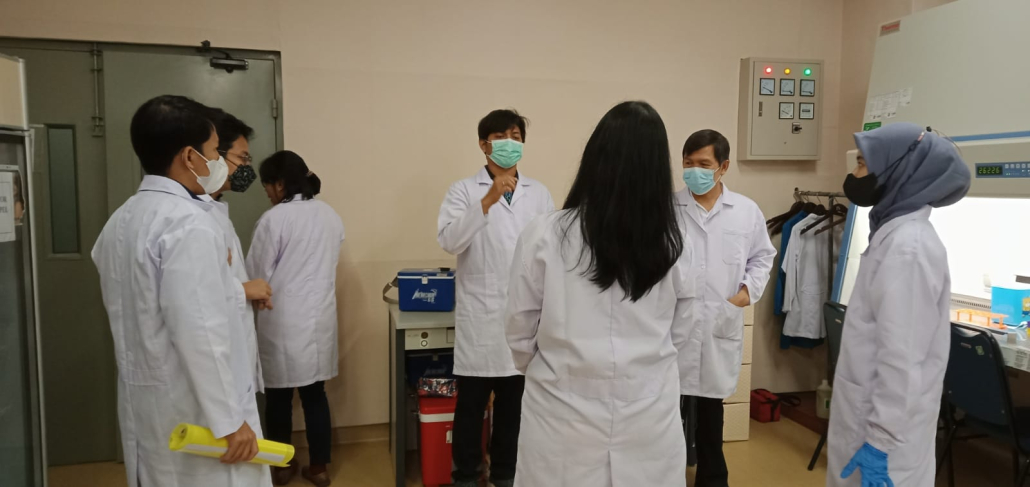
Biobank Trainning for BKPK
Advocation and Education 2023
- Participation in HRIE (Health Research Innovation and Expo) activities
- Contribution to accreditation activities
- Receive visitation from various institutions
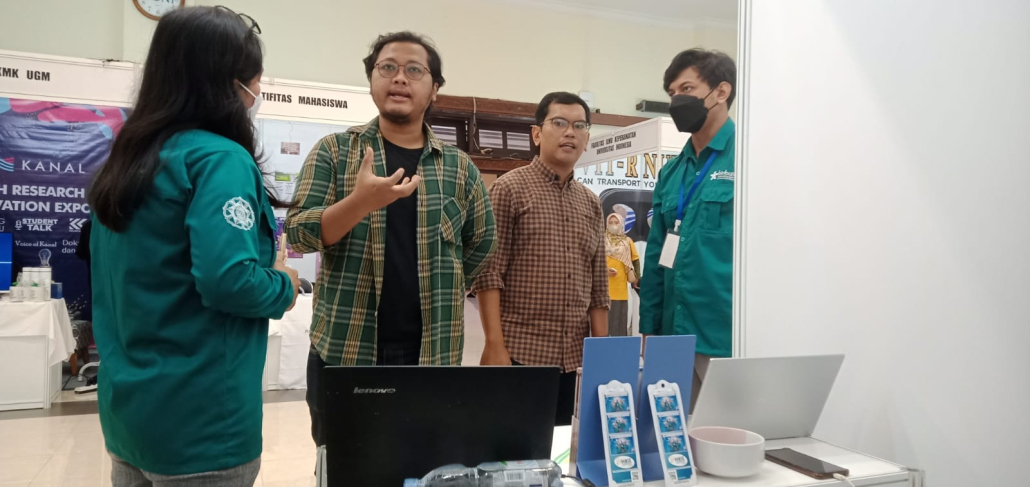
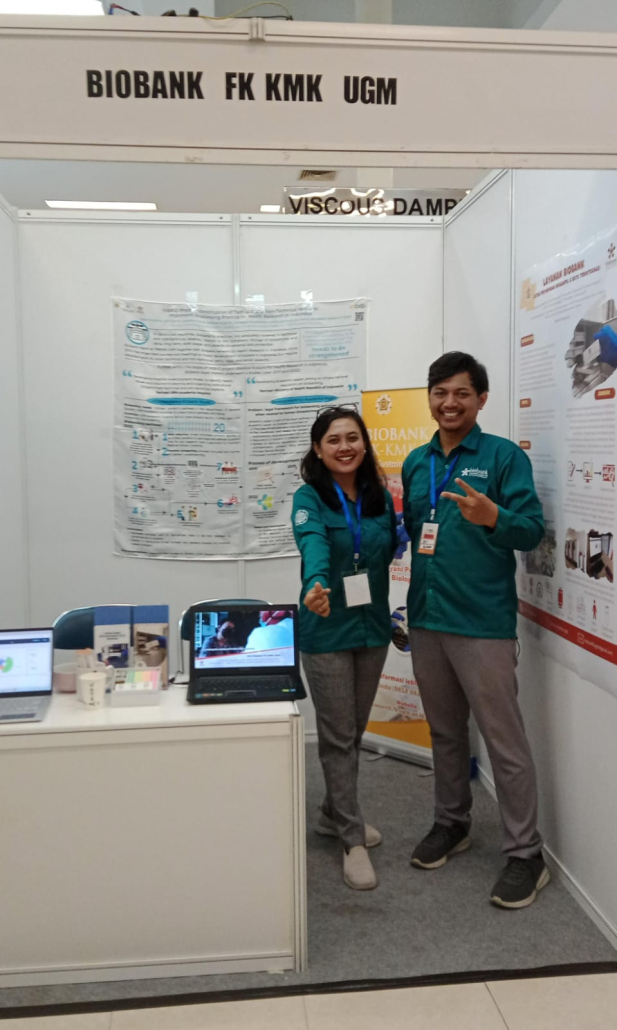
Participation in HRIE (Health Research Innovation and Expo) activities
2022
Increasing Human Resource Capacity
- Training of biobank technicians for handling infectious samples at RSUD Tangerang and INA-Respond
- Become a reference laboratory for GCLP training related to the topic sample traceability
- Internship acceptance (1 BGSi team member & 2 SIMKES FMPHN UGM Masters students)
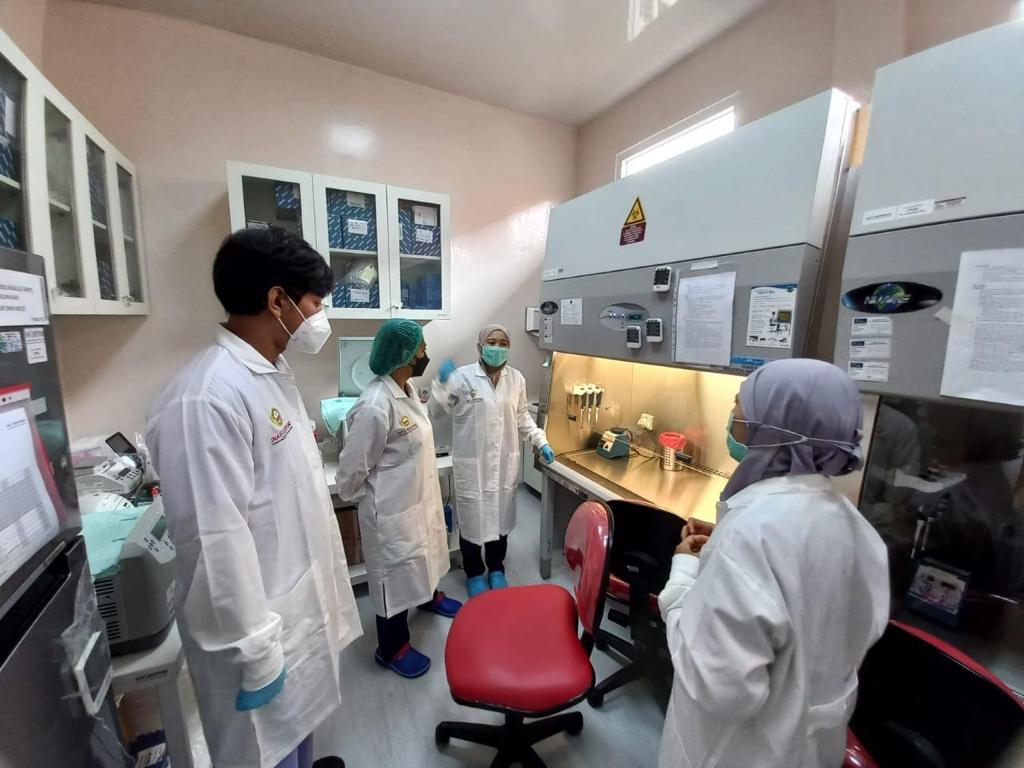
Infectious sample handling practices

Visit of GCLP training participants
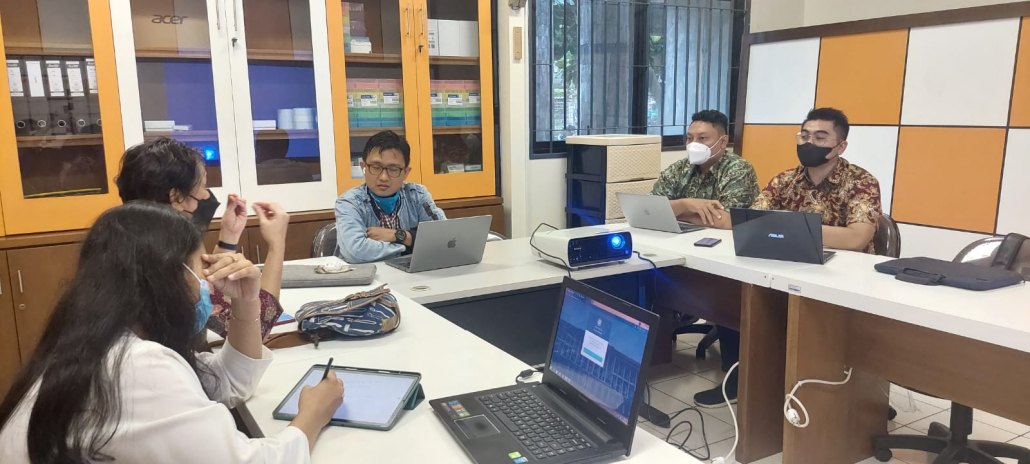
Coordination of student internships
Advocation and Education
- Development of a biobank training curriculum for Data Managers and Laboratory Technicians
- Contribution to accreditation activities (Doctoral Study Program, Dept. of Anatomical Pathology, PPDS Orthopedic Study Program)
- Participation in HRIE (Health Research Innovation and Expo) activities
- Participation in the IT Grant Exhibition regarding the development of MOOC (Massive Open Online Course with the theme Biobank in the Pandemic Era)
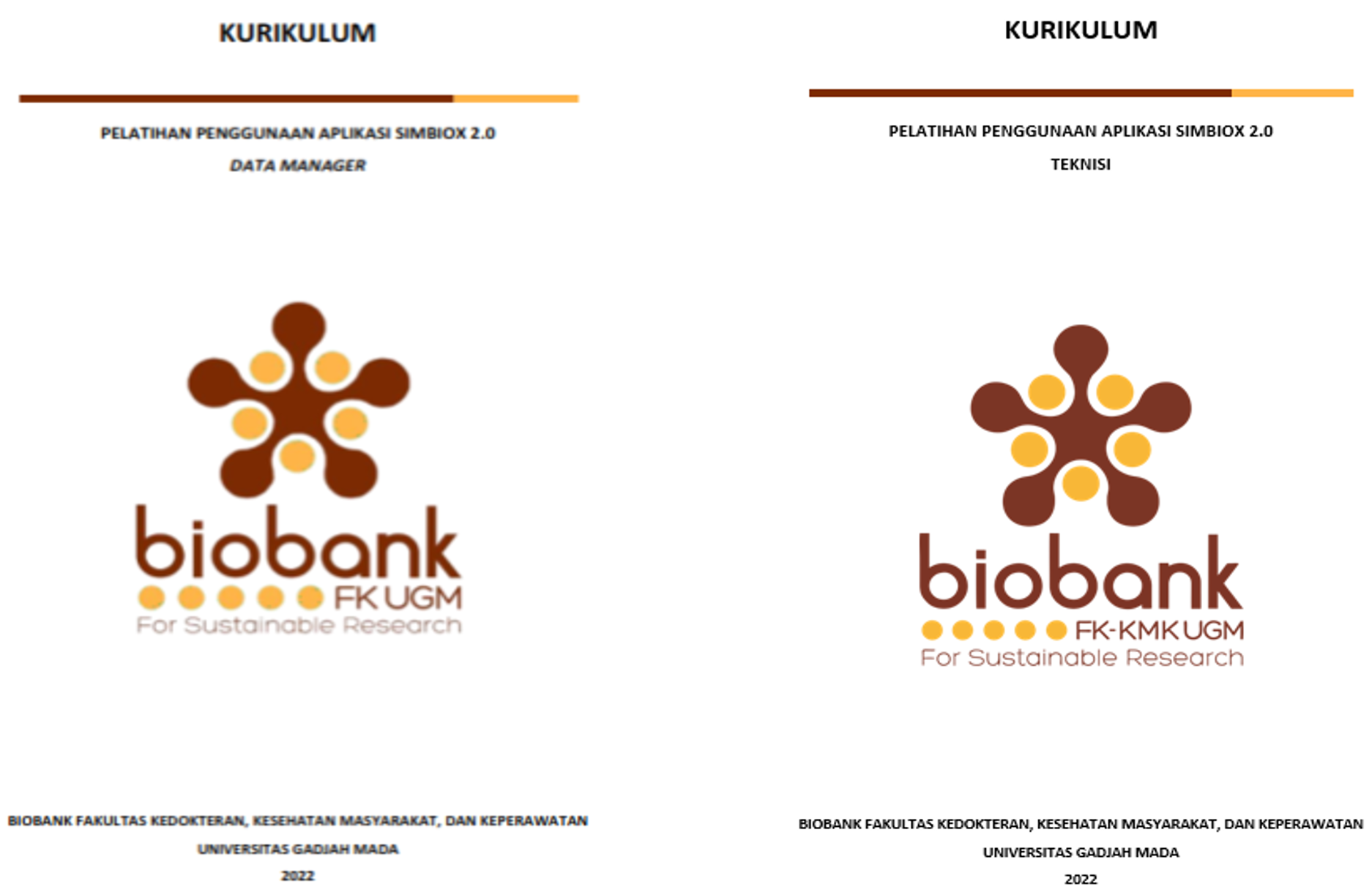
Biobank training curriculum

IT Grants Exhibition

Biobank in HRIE activities
RISPRO LPDP GRANT
- Preparation of academic paper and draft Government Regulations regarding biobanks for health
- Implementation of hospital-based biobank modeling at RSA UGM
Biobank Collaboration
- Collaboration on the Use of SIMBIOX with the Indonesian Ministry of Health’s DTO SIMBIOX is one of the basic systems used by BGSi
- Collaboration with various biobank SOPs with the Indonesian Ministry of Health
- Collaboration with PT Sisfomedika for the development of SIMBIOX 2.0

Colaboration on the use of SIMBIOX
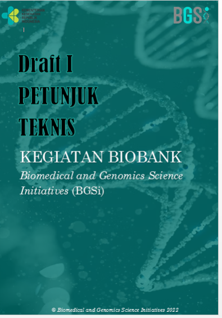
Collaboration in sharing SOPs
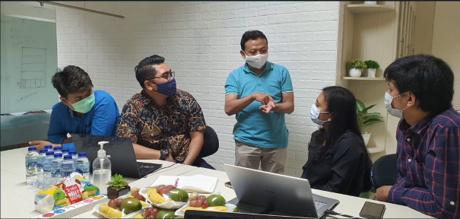
Biobank collaboration with PT Sisfomedika
Biobank Visitation
In 2022, biobank received visitation from various institutions.
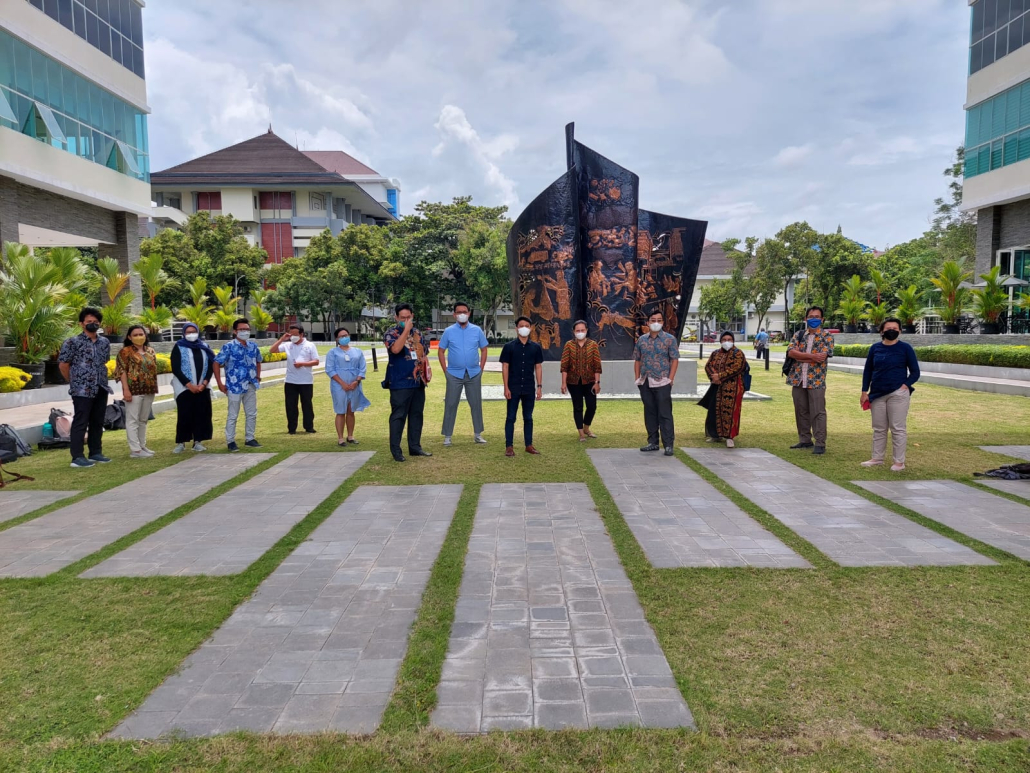
Visit from DTO for collaboration open source SIMBIOX

Visit form University of Nottingham
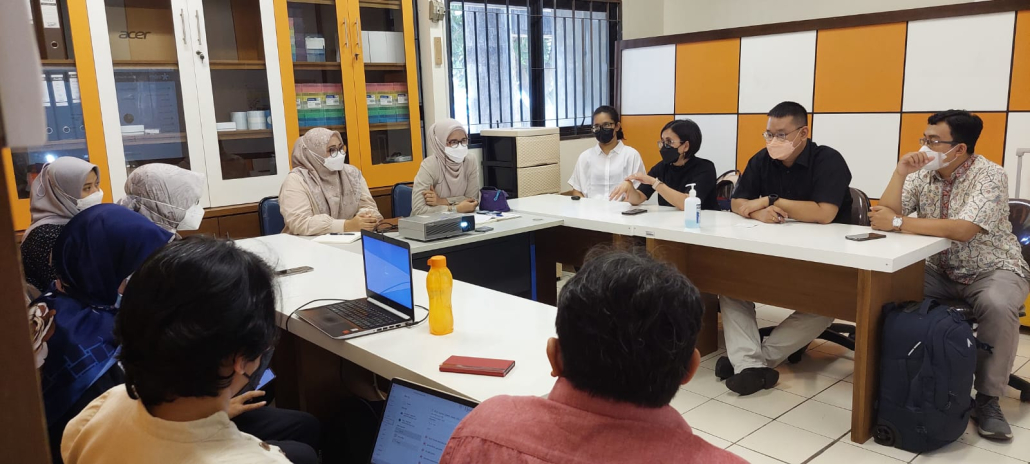
Visit from Biomedical Genome Based Science-Initiative (BGS-I) for Precision
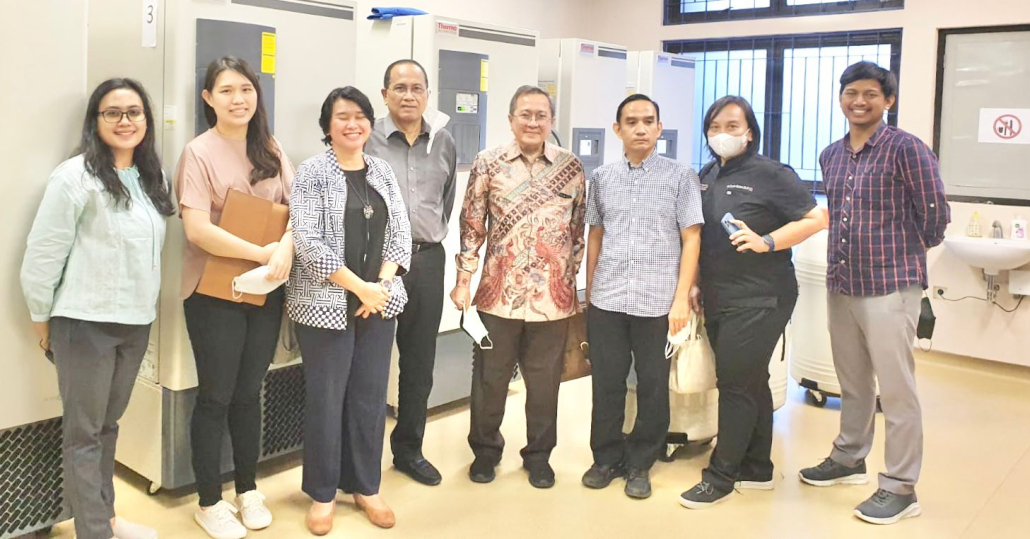
Visit from PON Hospital
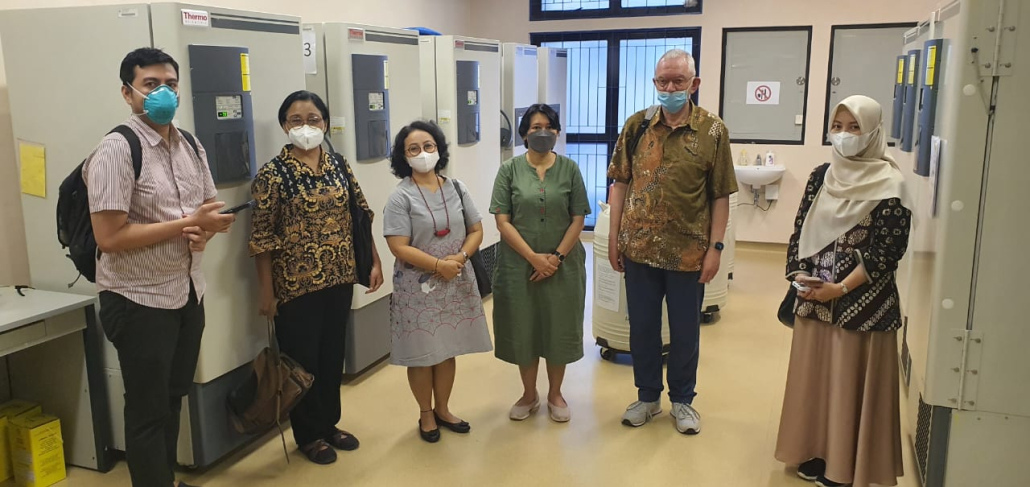
Visit from Netherlands University
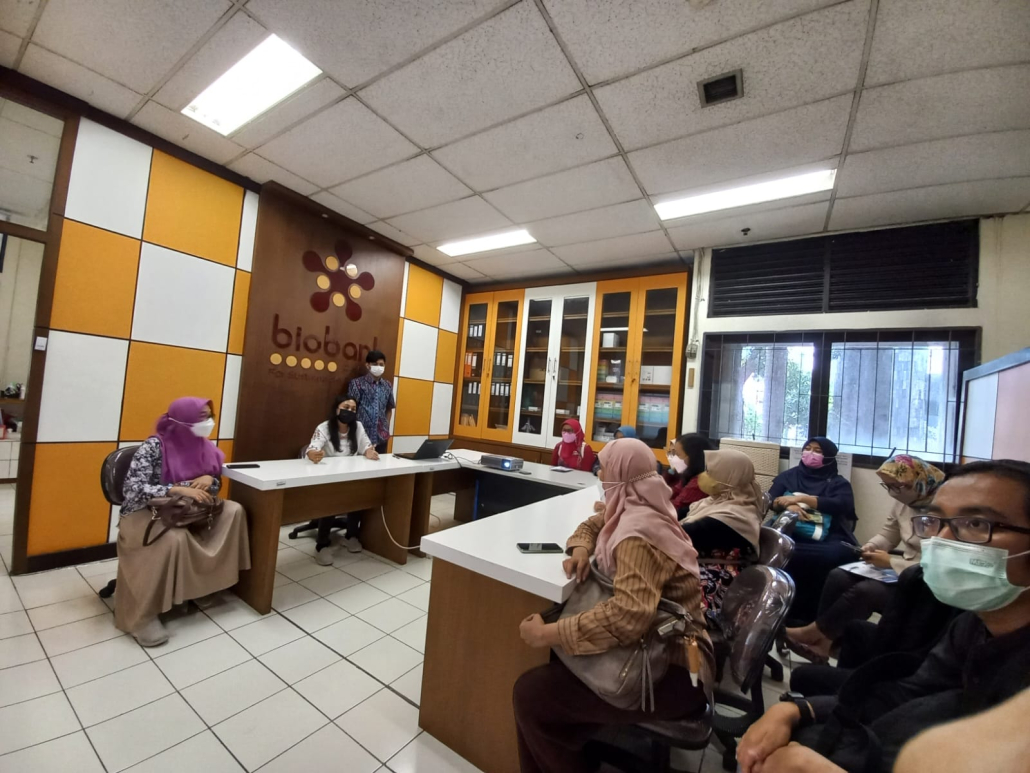
Visit from doctoral study program student
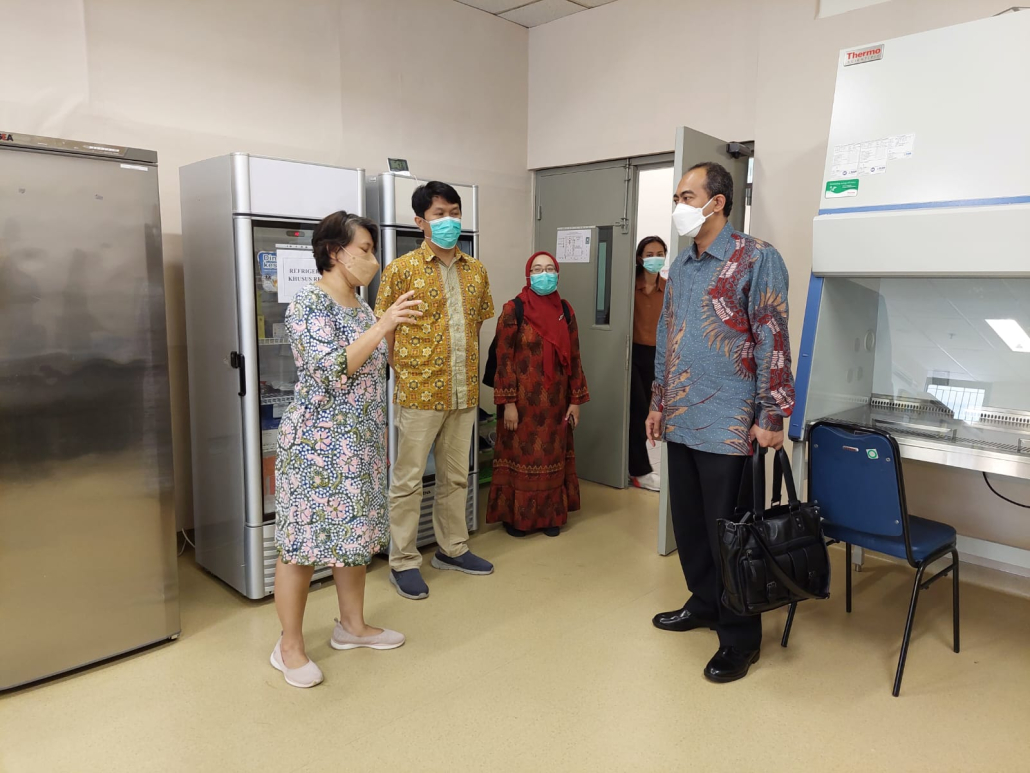
Visit Leader of BKPK Ministry of Health
Biobank Trainning
- Biobank technical training for RSA UGM laboratory staff
- Basic biobank training for the Indonesian Ministry of Health
Participants from RS Persahabatan, RS Kanker Dharmais, RS Harapan Kita, RS PON Hospital, RSCM, RS Dr Sardjito, Laboratorium Nasional, RSPI Sulianti Saroso, BGSI, RS Prof I.G.N.G Ngoerah, and BKPK Ministry of Health

Biobank technical training for RSA UGM laboratory staff
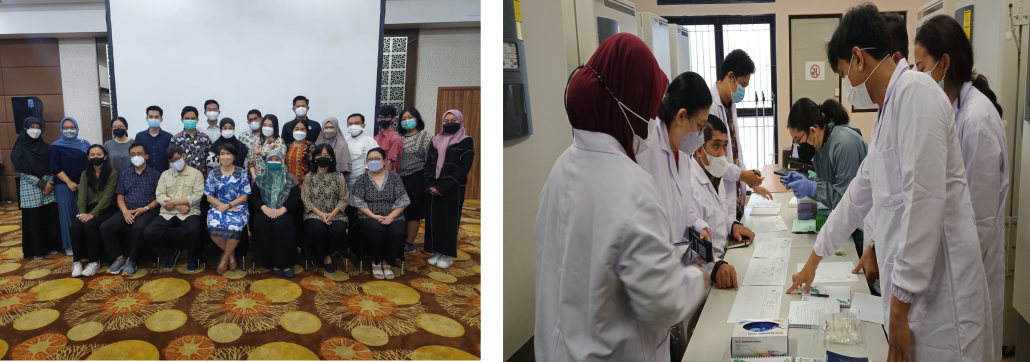
Basic biobank training for the Indonesian Ministry of Health
TECHNICAL GUIDEBOOK DEVELOPMENT
In 2018, Biobank FMPHN UGM received a research grant from the Indonesian Institute of Education Fund Management (or LPDP) to develop a biobank governance system for the development of research and health services in Indonesia. Biobank FMPHN UGM partnered with UGM Academic Hospital (RSA UGM), forming a unit called Medical Biobank for Health Research in Indonesia (MBRIO). In its implementation, MBRIO consists of governance, ethics, technical, and bioinformatics lines with the resulting output being a hospital-based biobank model. Even though it was stopped due to the COVID-19 pandemic, this project can be completed in 2022-2023.
Hospital-based biobank modeling is carried out by following the patient pathway by ensuring protocol compliance in each unit involved. This modeling was carried out in June-November 2022 involving 30 medical staff and 6 non-medical staff who had been given outreach and training.
From this modeling, research results are obtained that can be applied and adapted by other hospitals that will establish and develop biobanks. This research resulted in the book “Technical Guidelines for Modeling Hospital-Based Biobank” which has been registered with Intellectual Property Rights with no 000427347.
2021
Role of Biobank To Ensure Sustainability in Health Research
As one of the supporting facilities for research and clinical services (core facilities), Biobanks have an important role in the development of research at universities, especially for the medical and life sciences fields. Biobanks allow researchers to carry out many studies on an ongoing basis, with easy access to biospecimens and parallel data, whose completeness is maintained, and with proper preservation quality. In this context, biobanks become a very important element in guarantee the quality of research and services. In developed countries, clinical and population-based biobank facilities have become available an integral part of supporting research and clinical services, but in developing countries like Indonesia, biobanks are new. The Biobank FMPHN team has has a sample processing and storage laboratory along with a database system supporter. Currently, Biobank FMPHN UGM has provided processing and processing services storage of samples from researchers within the FMPHN UGM environment. At that moment simultaneously with the prospect of tripartite collaboration with 2 network hospitals (RSA UGM and RSUP dr. Sardjito), and also the collaboration with HDSS further strengthens the meaning of Biobank as a core facility for ongoing research and clinical services.
Goals:
- Increase the scientific competence and skills of students at all levels studies within the FMPHN environment regarding the development of biobanks for research sustainable health by bringing in experts from abroad
- Encourage collaboration between researchers within the UGM FMPHN environment
- Encourage the use of biosamples that have been collected collectively for the development of sustainable health research
- Encourage the development of academic collaboration, research and publications together with experts from abroad
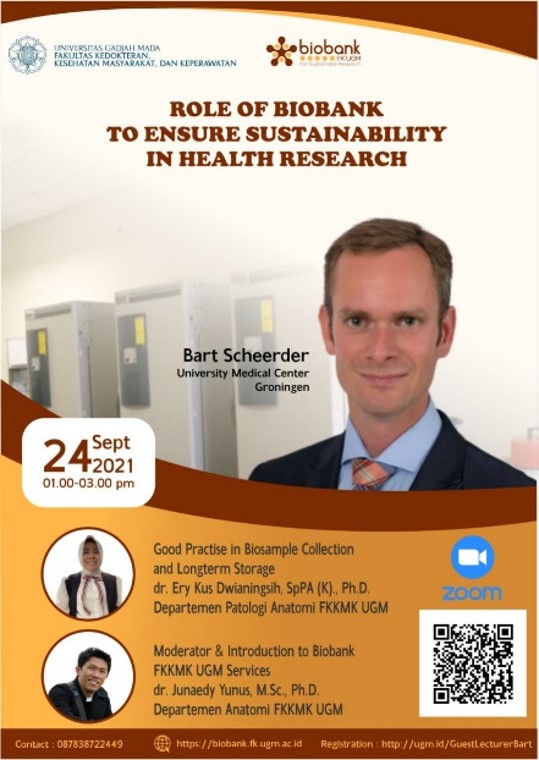
Role of Biobank To Ensure Sustainability in Health Research
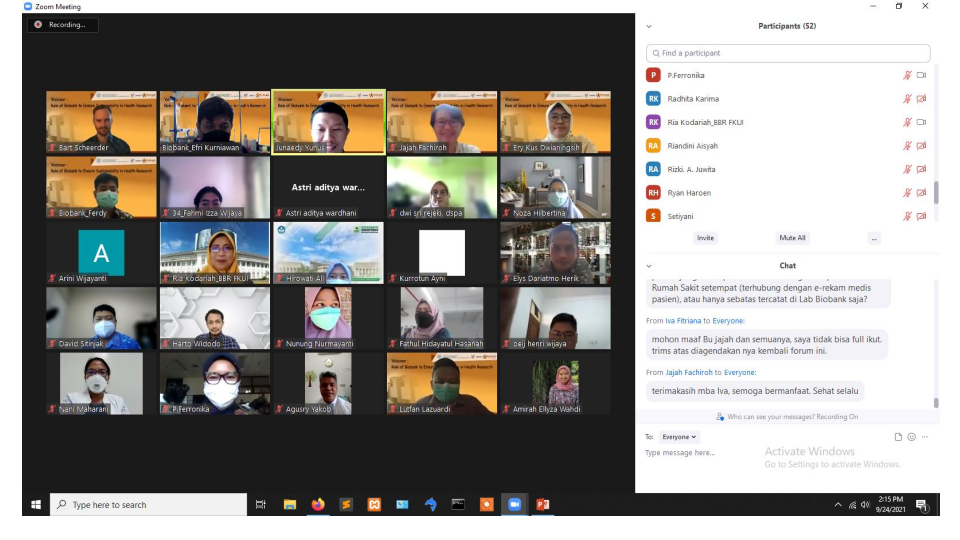
National Biobank Workshop Participants
National Workshop
In developed countries, clinical and population-based biobank facilities have become an integral part of supporting research and clinical services, but in developing countries like Indonesia, biobank are something new. Although often operating in the background, Biobanks play an important role in the diagnosis and development of treatments for various diseases. Currently we are witnessing the efforts of various countries competing to develop vaccines and other therapies for COVID-19. During a pandemic, patient sample collection, processing and analysis activities are at the forefront.
The problem of providing quality biospecimens has long been an important factor in the management of non-communicable diseases and emerging infectious diseases. COVID-19 presents several problems in world biobanking activities. The broad scope of the pandemic with more than four million cases globally as of mid-September 2021 means it is likely that the Biobank will handle many samples involved in the development of vaccines, diagnostic tools and treatments.
National Biobank Workshop VI “Biobank in the Pandemic Era” (connected to the 2021 TI grant)
Participants: 80 people, 16 institutions
Eijkman Institute, RSPAD Gatot Subroto, RSPI Sulianti Saroso, Balitbangkes, RSA UGM, RSUP Dr. Sardjito, Universitas Andalas, Universitas Indonesia, Al Azhar Islamic Universitas, Universitas Jember, Universitas Lambung Mangkurat, Universitas Negeri Lampung, Universitas Malikulsalleh, Universitas YARSI, FKG UGM, FK-KMK UGM.
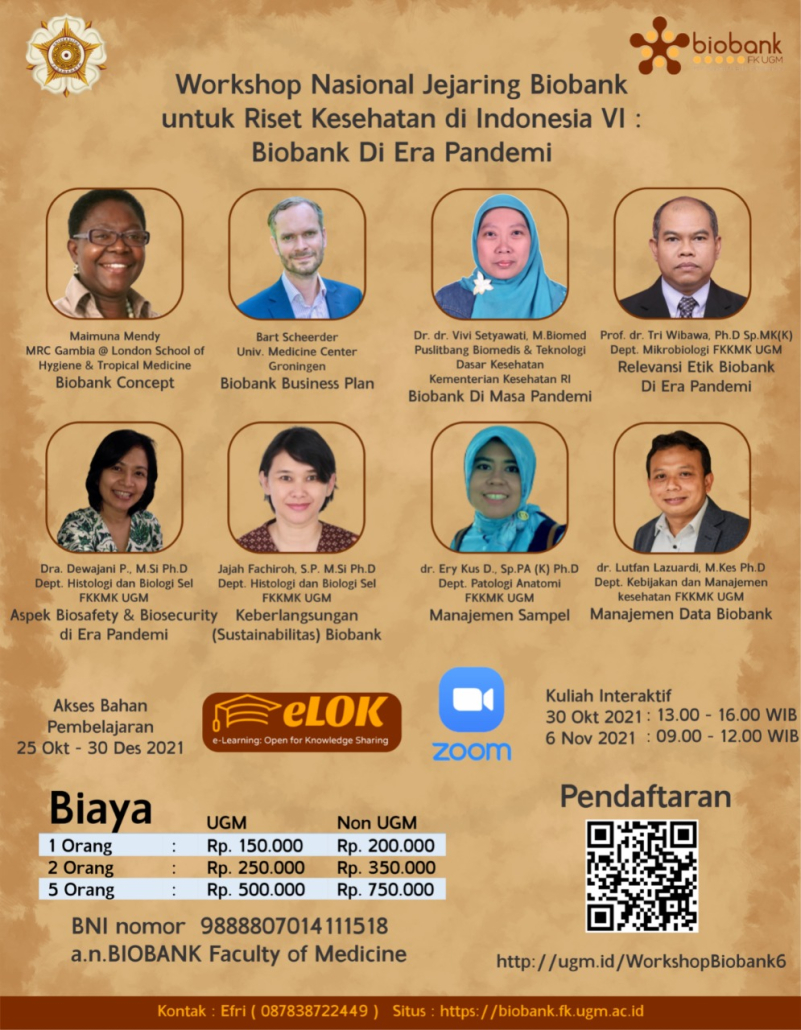
Flyer National Workshop
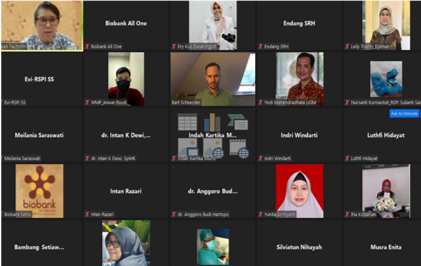
6th National Biobank Workshop Participants
Massive Open Online Cources
There is no educational material related to biospecimen and biobank management that meets the needs in Indonesia, even though the Biobank Team is the initiator of the annual Biobank Training activities at UGM and Indonesia which runs for 5 years. Biobank training materials will be prepared in the form of videos, written materials, references and assignment/evaluation of participants. The material will be available on eLOK, accessible to students and researchers at UGM, and will be part of the national biobank training material for health research in Indonesia.
The training material (MOOC) is the starting material for FMPHN UGM’s plan to become a “Biobank Training Center” using eLOK
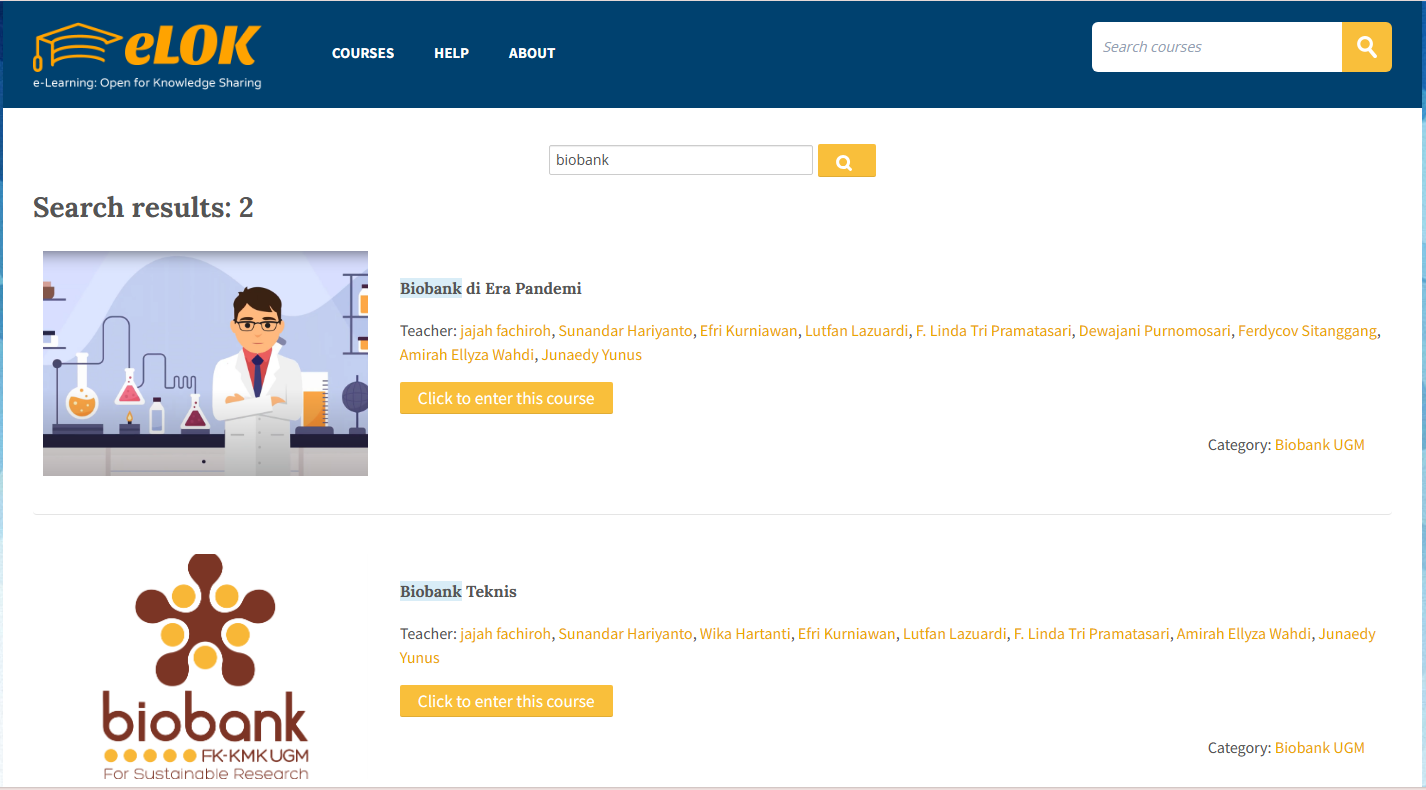
MOOC Biobank “Biobank di Era Pandemi”
SIMBIOX IPR
Biobank has a role in providing quality biosamples, The availability of high-quality biosamples has a relationship with the sustainability of ongoing research so that it can contribute to the development of science and public health. Gadjah Mada University through the Faculty of Medicine, Public Health and Nursing Biobank (FMPHN Biobank) has contributed to developing the Biobank in Indonesia. Along with the development of biobanks in Indonesia, the accompanying problems arose. One is the processing and utilization of human tissues and cells for health services and research purposes in Indonesia. Seeing this, the Biobank FMPHN UGM initiated the development of a computer program. The following computer program is the Biobank Management Information System (SIMBIOX). SIMBIOX provides support for the collection and processing of biosamples managed by Biobank. Simbiox is a biobank data management information system prepared by a team at FMPHN UGM. The system will be shared with laboratory who interested in using it (open sources system).
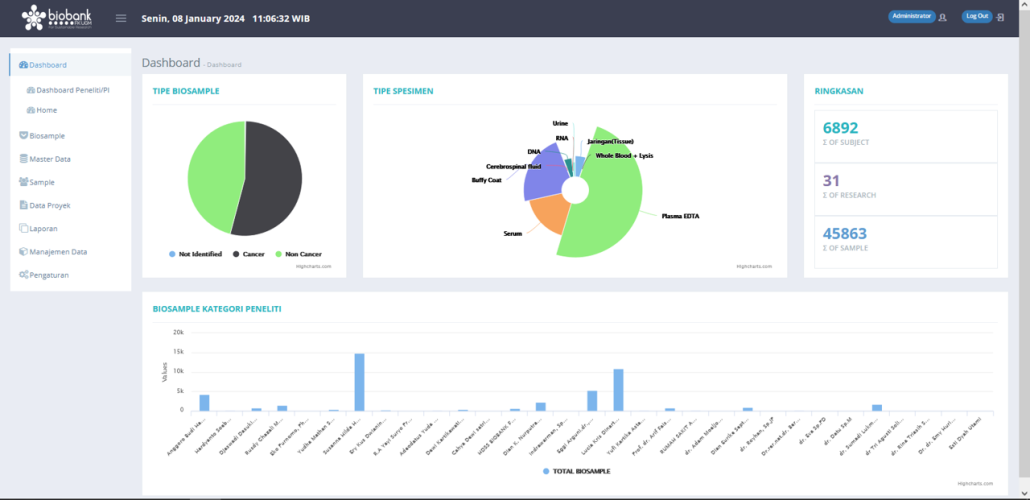
SIMBIOX
Publication at 2021
- Adjusment to COVID-19 Era: Ongoing Process at Biobank at Faculty of Medicine, Public Health and Nursing UGM, Yogyakarta, Indonesia
- Preparation of the “Lexique” for ISBER Best Practices 4th for Biobankers in Indo-Pacific Rim Region
- Diverse Responses of the Biobaks in Indo-Pacific Rim Region During the COVID-19 Pandemic: Case Scenarious from Two Low and Middle Income Countries and Two High Income Countries in the Indo-Pacific Rim Region
Biobank Visitation
In 2021, biobank received visits from various institution.
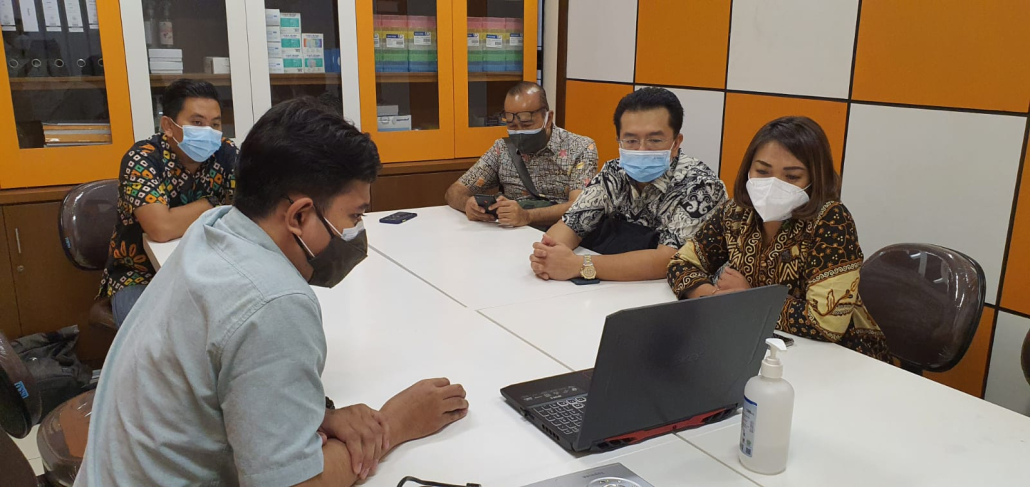
Exploring collaboration in the Digital sector with “Bio-Lab”
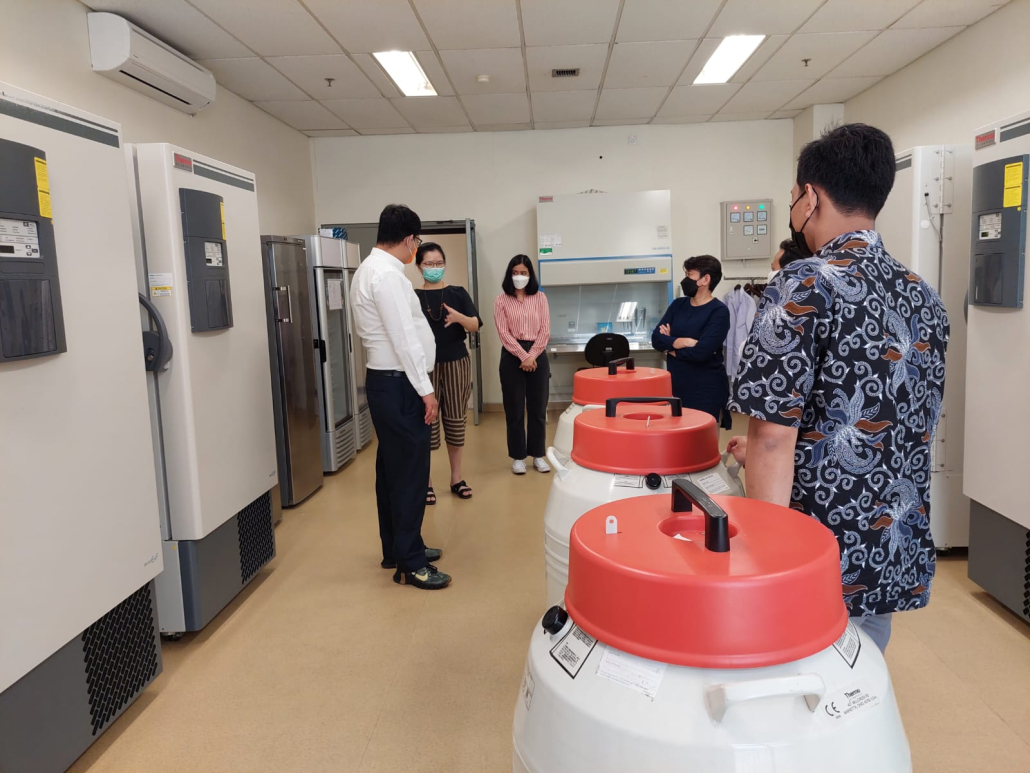
Visitation from DTO
Donggala Regional Health Laboratory visit
Educational Videos and Learning Advocacy
Biobank FMPHN UGM developed Educational Videos and Learning Advocacy with the assistance of FMPHN IT Grant funds. The video can be seen on Biobank’s YouTube.
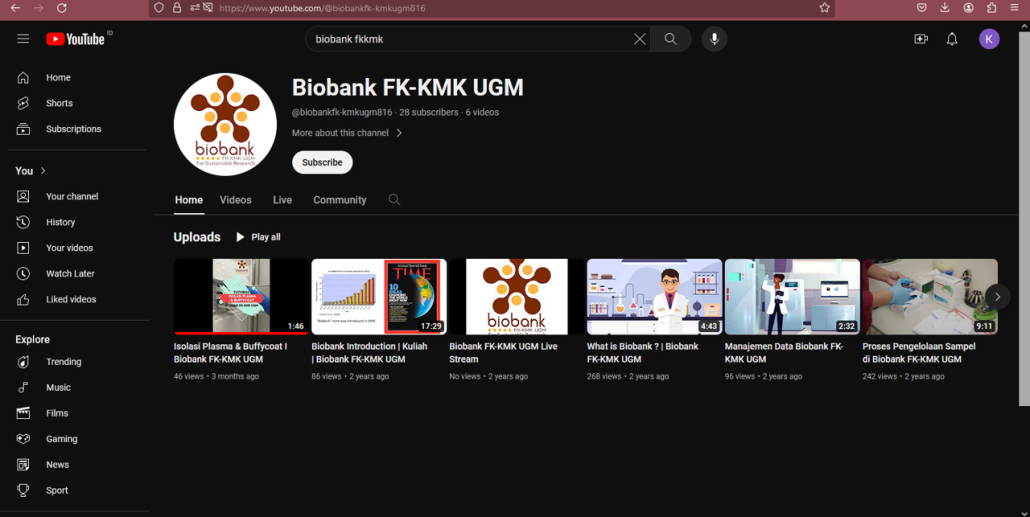
Youtube Biobank
Roadshow Biobank
Biobank Roadshow is an activity to introduce Biobank FMPHN UGM to the academic community, especially to researchers who are active or conducting research. Biobank Roadshow is carried out online and offline by visiting each unit or department. Biobank describes the concept, services and facilities of Biobank. Then explain how our process maintains the quality, traceability of data and samples.
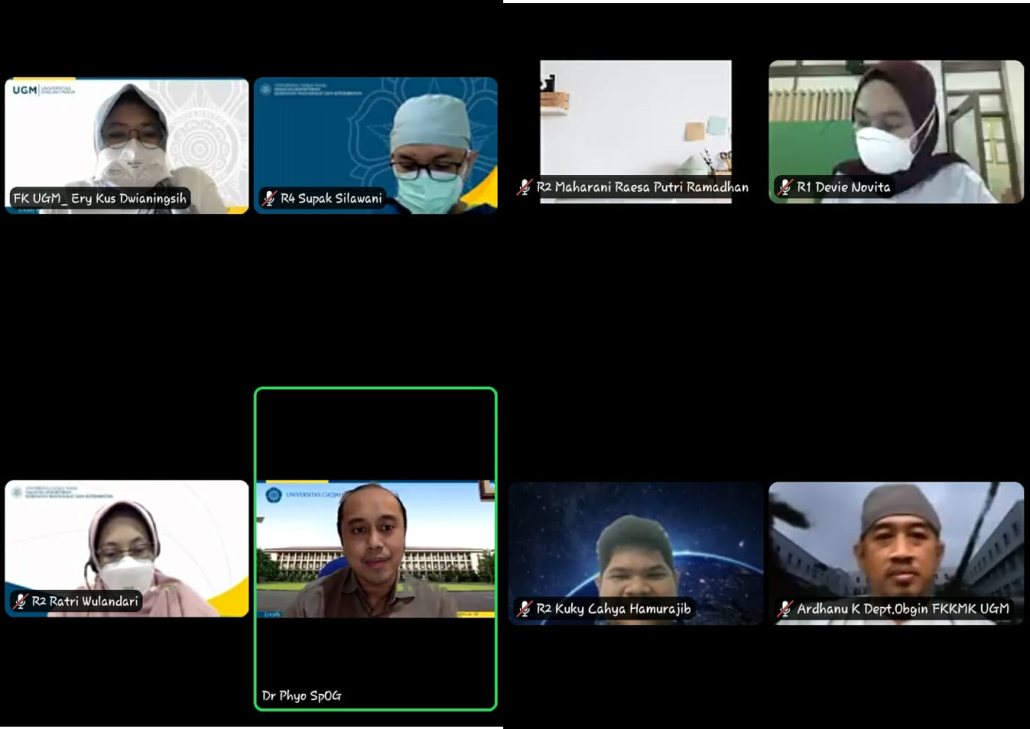
Roadshow to Pediatric research office (PRO), Dept. Surgery, Dept. Obsygn
2020
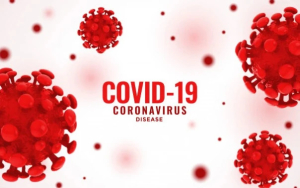
Source : image
From late 2019 to 2020, Indonesia was locked down due to the Covid-19 pandemic. The Chancellor of UGM issued a Circular regarding Maximum Limits on Campus Activities, based on this letter, all Biobank work is carried out at home (Work from Home). Each staff adjusts some the protocols such as
- Personal Protective Equipment (PPE):
- Ensure that all laboratory personnel wear appropriate PPE, including masks, gloves, and eye protection.
- Consider the use of face shields or goggles for additional protection.
- Follow guidelines from health authorities for specific PPE recommendations.
- Social Distancing:
- Implement social distancing measures in the laboratory, rearranging workstations and limiting the number of personnel in shared spaces.
- Consider staggered work schedules to reduce the number of people in the laboratory at any given time.
- Hand Hygiene:
- Emphasize and enforce strict hand hygiene practices, including regular handwashing and the use of hand sanitizers.
- Provide hand sanitizing stations at key locations within the laboratory.
- Laboratory Cleaning and Disinfection:
- Increase the frequency of cleaning and disinfecting laboratory surfaces, equipment, and common areas.
- Use disinfectants recommended by health authorities for SARS-CoV-2.
- disinfecting of sample containers when sample arrive at biobank using disinfection locker
- Sample Handling:
- Clearly define and communicate procedures for handling COVID-19 samples.
- Implement secure sample transport protocols within the laboratory.
- Processing sample on Biological Safety Cabinet
- Implement secure sample storage protocols within the laboratory.
- Training and Communication:
- Ensure that all laboratory personnel are adequately trained on the new protocols.
- Establish clear communication channels for updates and changes in protocols.
- Provide ongoing education on COVID-19 and the importance of following safety measures.
- Emergency Response Plan:
- Develop and communicate an emergency response plan in case of a COVID-19 exposure in the laboratory.
- Delegation of tasks to other laboratory personnel
- Monitoring and Compliance:
- Regularly monitor and enforce compliance with safety protocols.
- Conduct regular assessments to identify areas for improvement.
- Stay Informed:
- Stay updated on guidelines and recommendations from health authorities and adjust protocols accordingly.
Publication 2020
- The Responses of Biobanks to COVID-19
- Diverse Responses of The Biobanks in Indo-Pacific Rim Region During The COVID-19 Pandemic: Case Scenarios From Two Low- and Middle-Income Countries and Two High-Income Countries in The Indo-Pacific Rim Region
- Biobank Ensuring Sustainability in Health Research
COVID-19 Volunteering
All Biobank personnel volunteered for the UGM COVID-19 team at the Microbiology Laboratory of FMPHN UGM.
One personnel in the IT department and two personnel in the laboratory section. Personnels are tasked with time distribution so that Biobank services continue to run.
Tasks of UGM COVID-19 volunteers:
- Develop a system to record data from identity until laboratory test results of COVID-19 samples
- Laboratory technician in charge of receiving, dismantling, identifying and analyzing COVID-19 samples
2019
Cohort Biobank
The Faculty of Medicine, Public Health and Nursing, Universitas Gadjah Mada (FMPHN UGM) Yogyakarta Indonesia, has several core facilites including a Biobank and an HDSS (Health Demographic and Surveillance System). The biobank for research has been in operation since 2018; while the HDSS has completed four yearly survey cycles among 5,000 households in Sleman Municipality, Yogyakarta Special Province.
To elaborate the possibility for the establishment of a population-based cohort biobank, HDSS and FMPHN UGM Biobank underwent a preliminary study among HDSS participants, in collaboration with Sleman Municipality. The preliminary study tested protocols for recruiting, informed consent, questionnairing and blood sample collection. In return, participants received basic health monitoring (including blood glucose, cholesterol, BMI, and ECG) and health education about taking precautions against NCDs and a medical consultation.
The study was conducted for 2 weeks in May 2019. By the end of the study from a total of 240 invitations, 135 came to the recruitment points, with 95% of participation rate. In the consenting process, only a few subjects did not agree to have their information shared with parties outside UGM. All data is further amended to the HDSS database, while blood samples are stored in the Biobank. Evaluation of the activity is ongoing to further decide the best approach for the establishment of a cohort biobank.
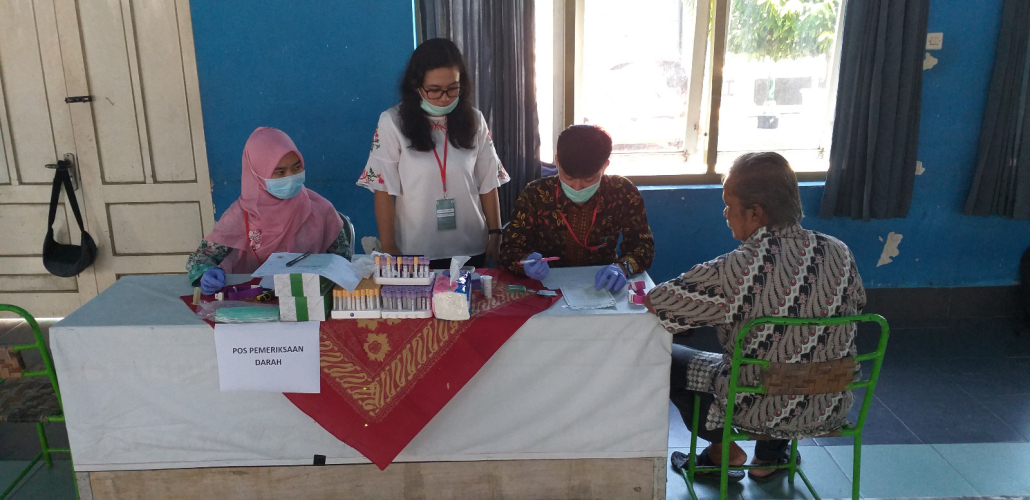
Biosample Collection for Cohort Biobank
Biobank Workshop
MANAGEMENT OF QUALITY CLINICAL SPECIMEN
In developed countries, clinical and population-based biobank facilities have become an integral part of supporting research and clinical services, but in developing countries like Indonesia, biobank are something new. To be able to apply and develop biobank that comply with international standards in developing countries like Indonesia, biobank need to continue studying biobank governance and good practices. Following up on this, the Biobank FMPHN UGM organized a National Workshop on Biobank Networks for Health Research in Indonesia with the theme Management of Quality Clinical Specimens with the aim of enriching technical knowledge and skills related to collection processes that meet technical quality and comply with ethical rules as well as enriching technical knowledge and skills related to DNA isolation. .
In 2019, Biobank FMPHNUGM again invited networking institutions and Bart Scheeders (Head of the UMCG international relations office; formerly technical manager of the Lifelines Cohort Biobank) to enrich knowledge related to daily biobank operations and provide input regarding management and business plans and discuss network organizations. biobank for health research in Indonesia
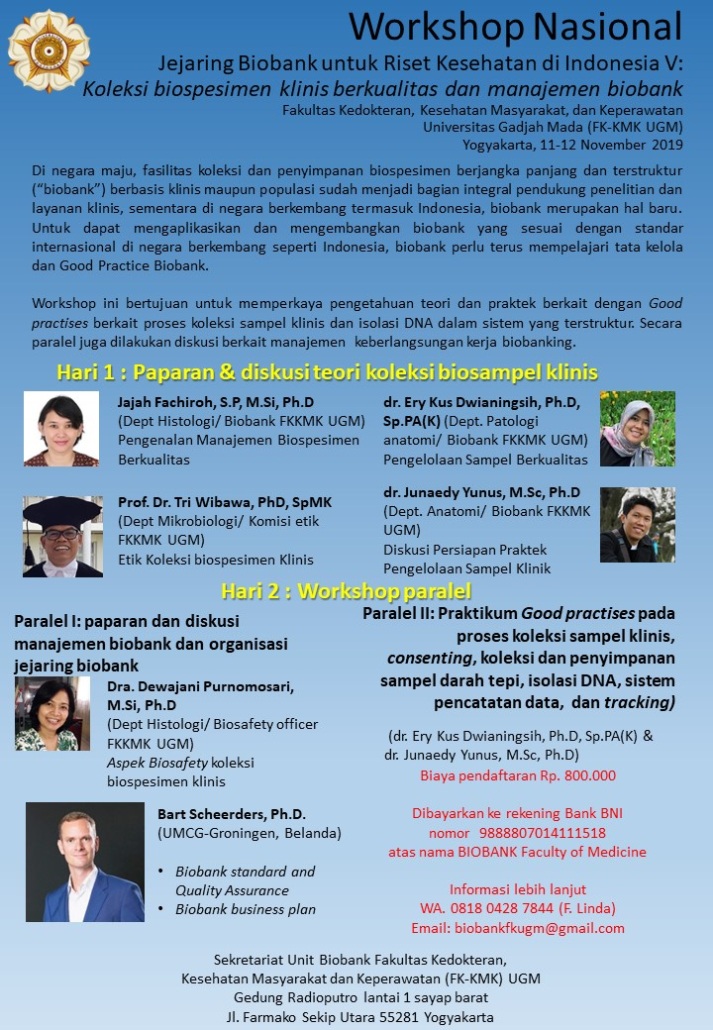
Flyer National Workshop Biobank
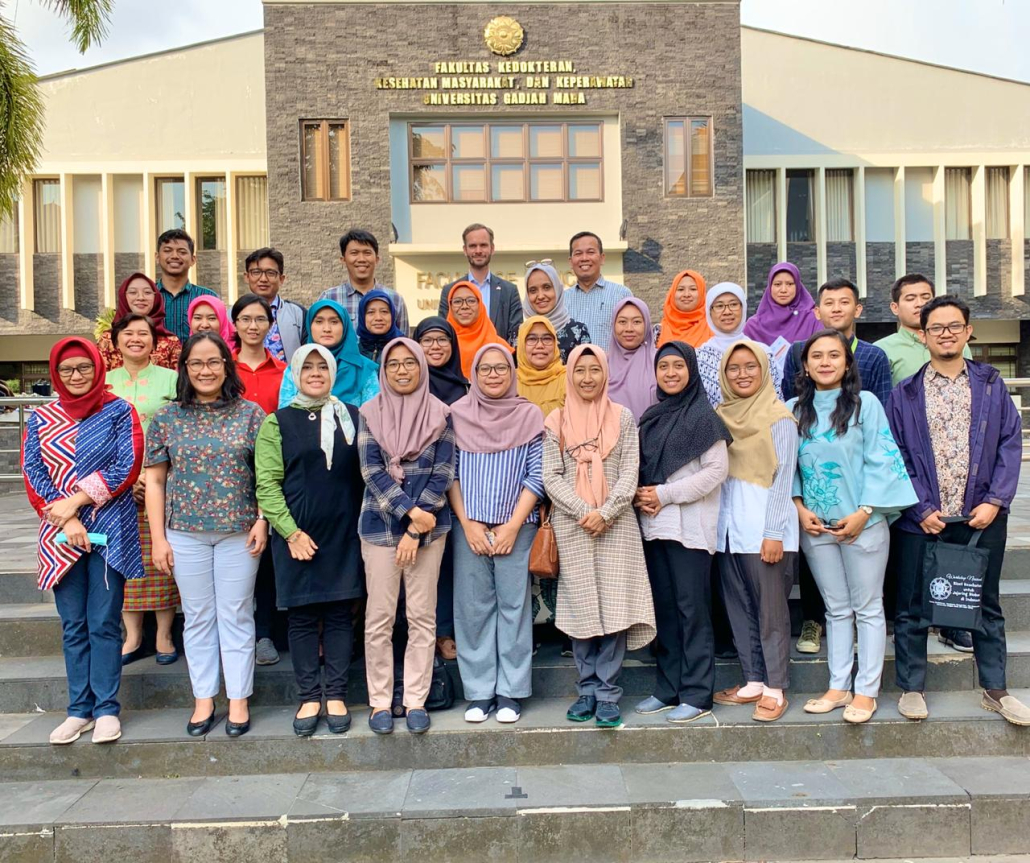
5th National Biobank Workshop Participants

Biosample Management Practices
Internal Workshop Biobank
An internal workshop was held to see performance achievements in 2019, what things had not been implemented, as well as performance evaluation. The activity continued with a discussion on the 2020 work plan.
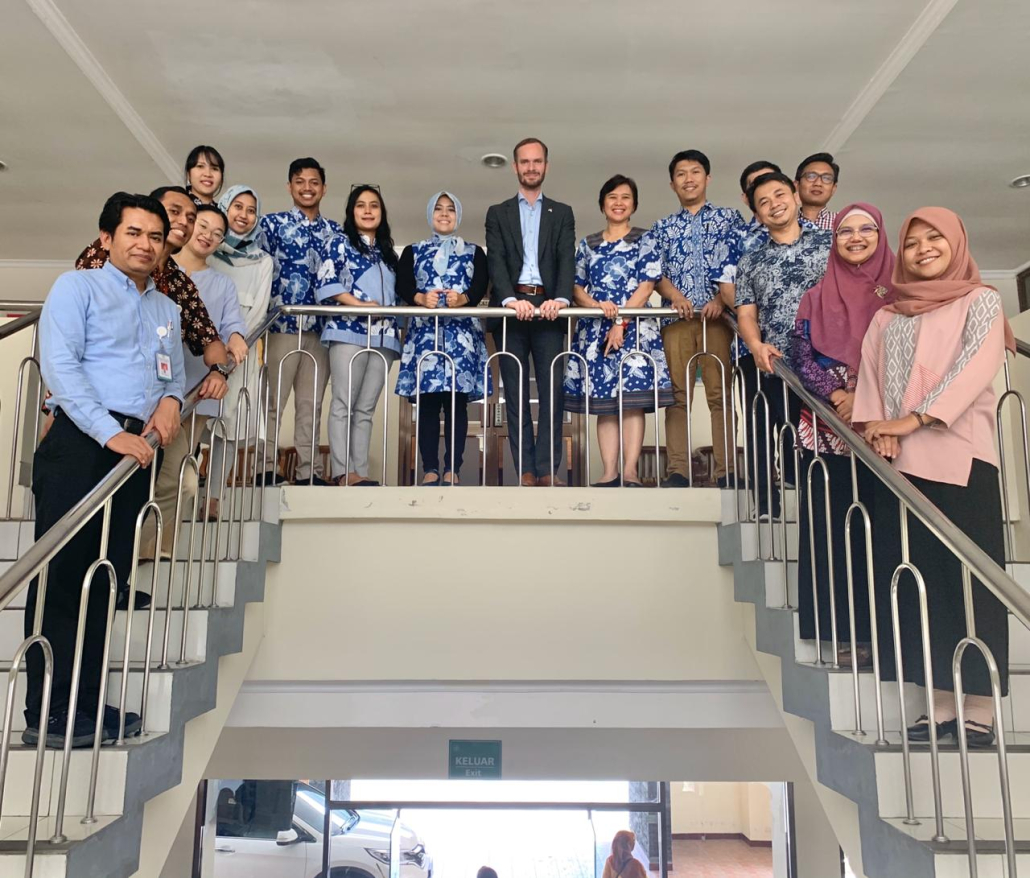
Internal Biobank Workshop Participants
Grand Opening Storage & Room Staff
Coinciding with the Health Research Expo (HRE), Tuesday (20/8) Deputy Dean for Research and Development at the Faculty of Medicine, Public Health and Nursing (FK-KMK) UGM, dr. Yodi Mahendradhata, MSc., PhD., inaugurated Biobank.
The facilities and infrastructure of the UGM FK-KMK Biobank which were inaugurated consisted of a storage room (body fluid sample processing unit as well as a -80C freezer system and liquid nitrogen tank) as well as a staff room/meeting room.
The UGM FK-KMK Biobank was initiated in 2015, consisting of a development team of 5 people. Modeling and research related to Biobank was carried out for 3 years. Since 2018 limited services for storing biosamples and their parallel data have been started. Currently the biobank development team consisting of 6 people is still working on developing the system, while daily service is carried out by 2 technicians and 1 data manager.
Biobanks are expected to become part of joint research facilities that enable cross-disciplinary collaboration, as data-generating infrastructure. To answer these challenges, the development of a hospital-based biobank within the framework of the Academic Health System (AHS) and the Biobank cohort with HDSS Sleman is very necessary. (Linda/Contributor)
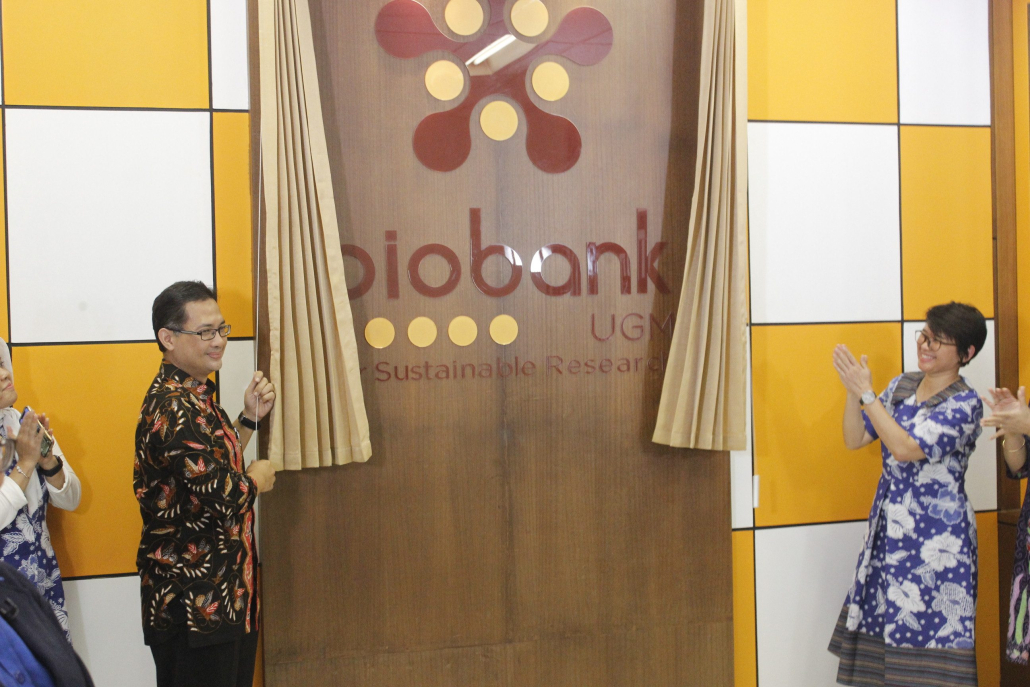
inaugurated Biobank
Publication
Scientific publications regarding Biobanks are accepted in the Biopreservation and Biobanking journals.
Development of a Biobank from a Legacy Vollection in Universitas Gadjah Mada, Indonesia: Proposed Approach for Centralized Biobank Development in Low-Resource Institutions.
Biobank Research
Biobank FK-KMK UGM received grant funding from the LPDP Ministry of Finance
In November 2018, the Biobank Unit of the Faculty of Medicine, Public Health and Nursing (FMPHN) Gadjah Mada University (UGM) received research grant funding from the Indonesian Education Fund Management Institute (LPDP Indonesia) to develop a biobank governance system for research purposes in Indonesia. In collaboration with the UGM Academic Hospital (RSA) and the Research and Development Agency of the Ministry of Health of the Republic of Indonesia (Balitbang Kemenkes). The title of the research is “Modeling System and Biobank Policy Framework for Health Research in Indonesia”. The research aims to:
- Produce a concept/ draft policy/ system regarding Biobanks in Academic Institutions in Indonesia
- Registration of national/ international scientific publication
Currently, the output in the form of academic paper and modeling has reached 80% of the expected target. The academic paper and zero draft regarding the Draft Minister of Health Regulation regarding the implementation of Biobanks for Health Research have been submitted to the Indonesian Ministry of Health’s Balitbangkes for further review at the workshop on November 13th 2019.
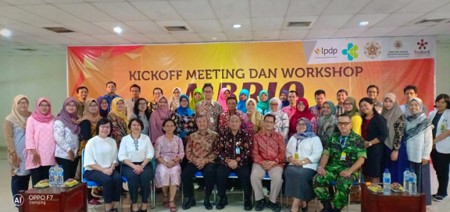
Kickoff meeting attended by AHS research and networking partners
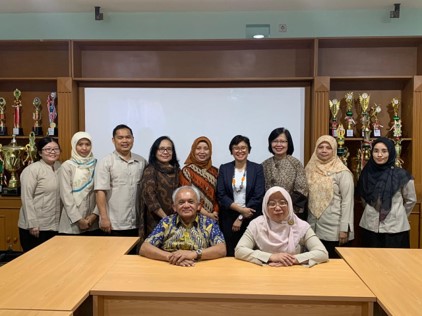
Submission of academic paper and zero draft of the Minister of Health’s draft regulation regarding Biobanks to the Indonesian Ministry of Health’s Balitbangkes
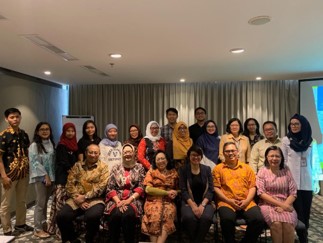
Biobank modeling finalization workshop at RSA UGM
Biobank Visitation
In 2019, biobank received visits from various institution.
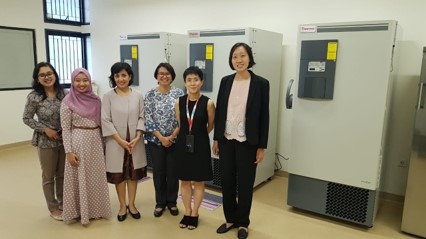
Visit from Oncocare Study

Visits from the local government and the people from Sleman
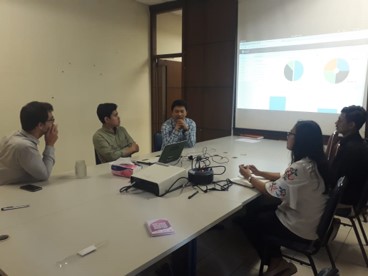
Visit from Jerome Chalmer, Dept. Health Bioinformatics Warwick Medical School
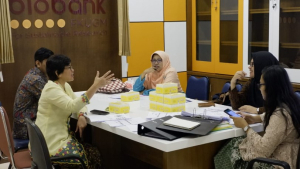
Biobank has completed carrying out an internal quality audit from the GCLP and Biosafety teams.
2018
4th National Biobank Workshop
4th Indonesia Research Biobank Network Workshop and Biobank Seminar with the theme “Defining Business Model of Institutional Biobank”, held on 12-13 November 2018 at the Hall of Faculty of Medicine, Andalas University. The discussion topics are Biobank on Cohort Network (BCNet) to Foster Biobank Network in LMIC, Lifelines: The role of cohort biobank for research, Indonesia research biobank network, conception and development of tissue biobank. This activity was attended by international speakers, Dr. Maimuna Mendy (Head of IARC Biobank & Coordinator of BCNet WHO-IARC) and Dr Baart Scheerder (Technical Manager of Biobank UMCG, The Netherlands/Lifelines).
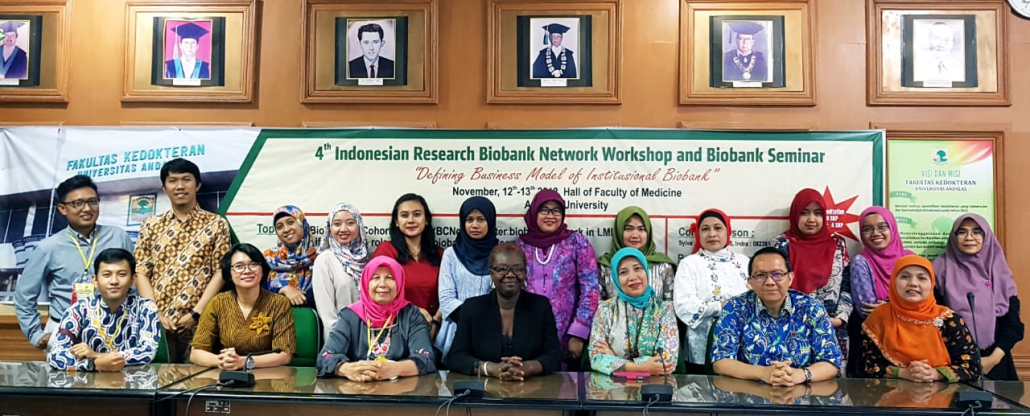
4th National Biobank Workshop Participants at Universitas Andalas Padang
2nd Internal Biobank Workshop
Internal Biobank Workshop is a continuation of 1st internal biobank workshop involving UGM Biobank, Sardjito Hospital, and UGM Academic Hospital. This Internal Biobank Workshop was held on November 9-10 2018 at FMPHN UGM.
This workshop further discussed progress of biobanking activities at the three institutions and biobank sustainability for the 5-year long-term plan. Apart from that, UGM Biobank again invited international speakers Dr. Maimuna Mendy (Head of IARC Biobank & Coordinator of BCNet WHO-IARC) and Dr Baart Scheerder (Technical Manager of Biobank UMCG, The Netherlands/Lifelines).
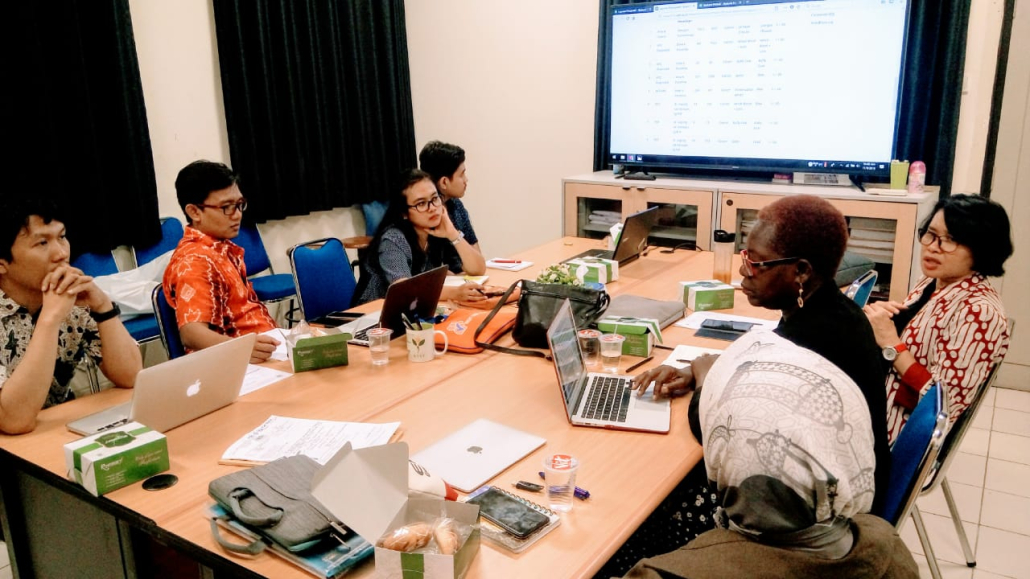
Internal Biobank Workshop Participants
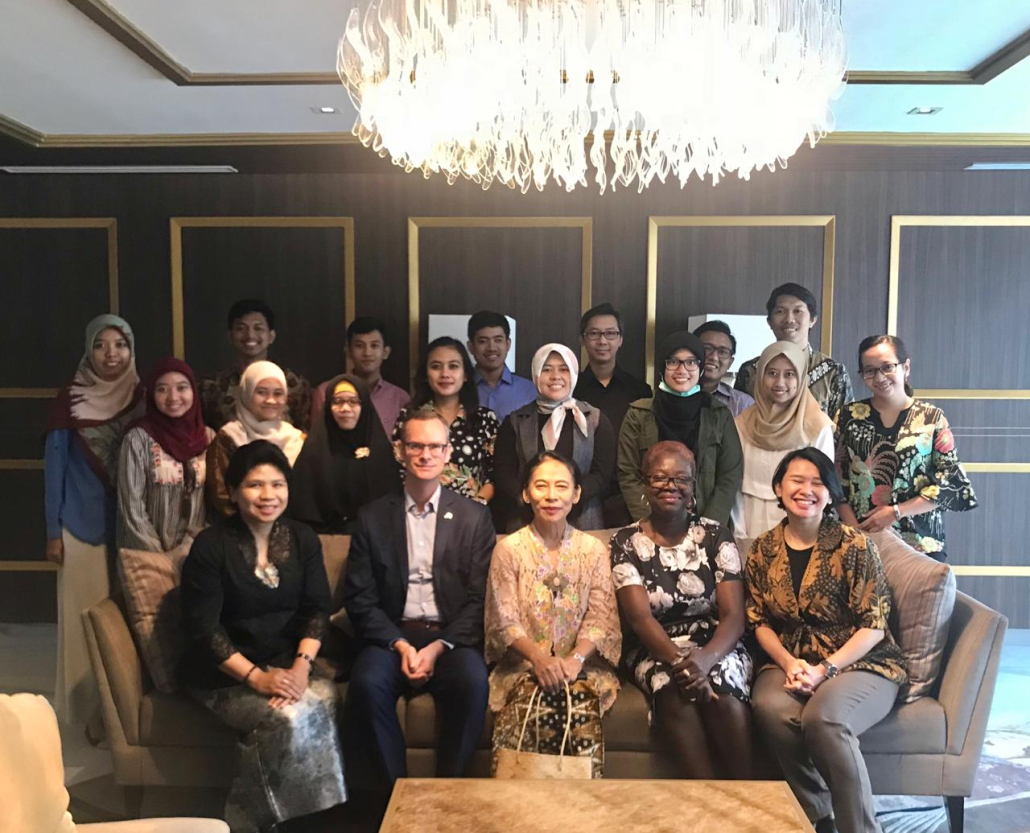
Internal Biobank Workshop Participants
Prospective Database Creation
Database creation was carried out by dr. Lutfan Lazuardi, M.Kes., Ph.D as Head of Program and Sunandar Hariyanto, S.T., M.Eng and Ferdycov Sitanggang, S.KM, M.PH as Programmer in 2018 on a web-based basis.
The biorepository application system is a system developed for the purpose of managing biosample data electronically. This application manages information data regarding the subject (the patient whose sample was taken), biosample type data by including other information such as the unique biorepository code, box code, position code, date. received, received by whom, type of sample, final analyte results, tube type, degree of storage temperature, sample owner (researcher) and so on.
The creation of this prospective biorepository application system database will later be called SIMBIOX.
ISBER 2018
International Society for Biological and Environmental Repositories (ISBER) 2018 SEIZING BIG OPPORTUNITIES IN BIOBANKING THROUGH DATA, COLLABORATION AND INNOVATION which was held on May 20-24 2018 in Dallas, USA.
This activity was attended by Jajah Fachiroh, S.P, M.Si, Ph.D, who explained the “Development of a Biobank for Research in an Academic Institution in Indonesia: How to Keep on Going”.
Hospital-Based Biobank Modeling
In 2018, collaboration was carried out between UGM Biobank with the Indonesian Ministry of Health and UGM Academic Hospital to build a hospital-based biobank and create a biobank policy for health research. So, the preparation and application for RISPRO LPDP (Indonesia Endowment Fund for Education Agency) funding was carried out under the auspices of the Indonesian Minister of Finance.
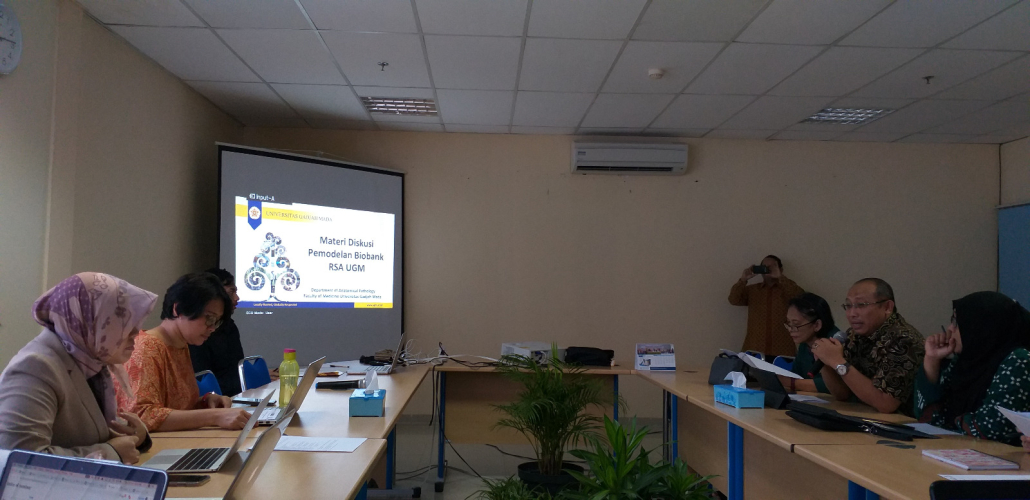
2017
Prospective Modeling 2017
In accordance with the work plan of the UGM FK Biobank Team in 2017, from September to December 2017, modeling has been carried out for prospective samples of the UGM FK Biobank Team.
In total there are five research projects involved in this phase after obtaining permission from the researchers of each project. These seven studies produced 557 biological samples (tubes) from 131 subjects involved in the prospective phase modeling.
Modeling was carried out after going through various stages, including 2x prospective modeling preparation workshops with prospective researchers who would join. Next, interested researchers will sign a contract form for prospective modeling. A total of seven researchers joined to be part of this modeling. The modeling results are briefly shown in the table on the next page.
3rd National Biobank Workshop
3rd National Biobank Workshop was held on 6-7 November 2017 at IMERI Faculty of Medicine, University of Indonesia, Jakarta. This workshop has the theme “Strengthening the research biobank network through capacity building” with international speakers Dr. Maimuna Mendy (Head of IARC Biobank & Coordinator of BCNet WHO-IARC) and Dr Baart Scheerder (Technical Manager of Biobank UMCG, The Netherlands/Lifelines).
The topics presented were related to how to start a biobank, IARC catalog program, MIABIS, Data sharing policy, BCNet, EPIC, Sample quality, Sample ownership.
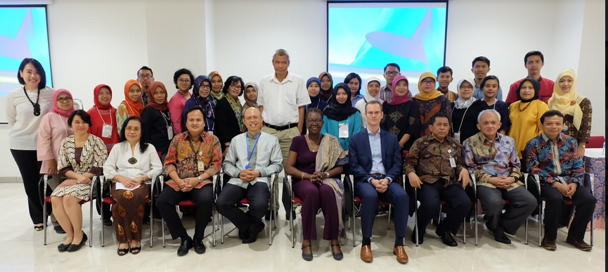
3rd National Biobank Workshop
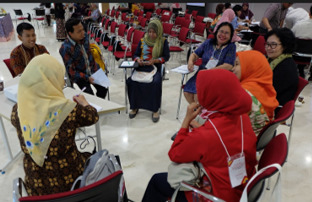
Participants Discuss White Paper
Internal Biobank Workshop
Internal Biobank Workshop is a continuation of the system initiation (network) workshop involving UGM Biobank, Sardjito Hospital, and UGM Academic Hospital. This Internal Biobank Workshop was held on November 4 2017 at FMPHN UGM.
This workshop further discussed biobanking activities at the three institutions for the 5-year long-term plan. Apart from that, UGM Biobank again invited international speakers Dr. Maimuna Mendy (Head of IARC Biobank & Coordinator of BCNet WHO-IARC) and Dr Baart Scheerder (Technical Manager of Biobank UMCG, The Netherlands/Lifelines).
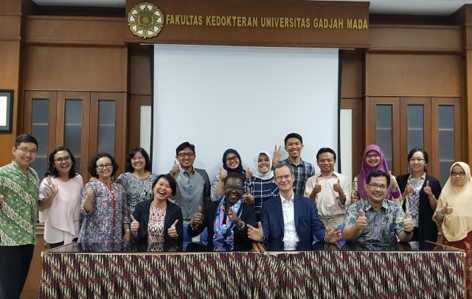
Internal Biobank Workshop Participants
ISBER 2017
International Society for Biological and Environmental Repositories (ISBER) 2017 Annual Meeting and Exhibits Due North: “Aligning Biobanking Practice With Evolving Evidence and Innovation” which was held on 9-12 May 2017 in Toronto, Ontario, Canada.
This activity was attended by two Biobank members, namely Jajah Fachiroh, S.P, M.Si, Ph.D and dr. Ery Kus Dwianingsih, Ph.D, Sp.PA, who explained the retrospective modeling at Biobank UGM and Network Biobank in Indonesia.
IARC BCNet Biobank Training for Pathologists and Pathology Technisians
IARC BCNet biobank training for pathologists and pathology/histology technicians, Children’s Cancer Hospital Egypt – 57357, May 2017. At this event, dr. Ery Kus Dwianingsih, Ph.D., Sp.PA(K) presented Biobank Activities at Faculty of Medicine, UGM Indonesia.
2016
Preparation of Prospective Protocols
In 2016, the Biobank Team prepared a perspective system in the form of preparing SOPs, technical instructions and data storage systems, as well as outreach efforts.
Creation and Maintenance of a Retrospective Database
Database creation and maintenance was carried out by dr. Lutfan Lazuardi, M.Kes., Ph.D as Head of Program and Sunandar Hariyanto, S.T., M.Eng as Programmer in 2016 on a web-based basis.
The biorepository application system is a system developed for the purpose of managing biosample data electronically. This application manages information data regarding the subject (the patient whose sample was taken), biosample type data by including other information such as the unique biorepository code, box code, position code, date. received, received by whom, type of sample, final analyte results, tube type, degree of storage temperature, sample owner (researcher) and so on.
Its use is directly related to physical samples at the FMPHN UGM Molecular Biology Laboratory. During a year of use, several database deficiencies were discovered which were then evaluated and corrected.
2nd National Biobank Workshop
The second national biobank workshop was held in the UGM University Club (UC) Sekip Room on 7-8 November 2016. The workshop with the theme “Building a Biobank Network in Indonesia: Biobank Governance”, invited speaker Dr. Maimuna Mendy (Head of IARC Biobank & Coordinator of BCNet WHO-IARC) and Dr Baart Scheerder (Technical Manager of Biobank UMCG, The Netherlands/Lifelines).
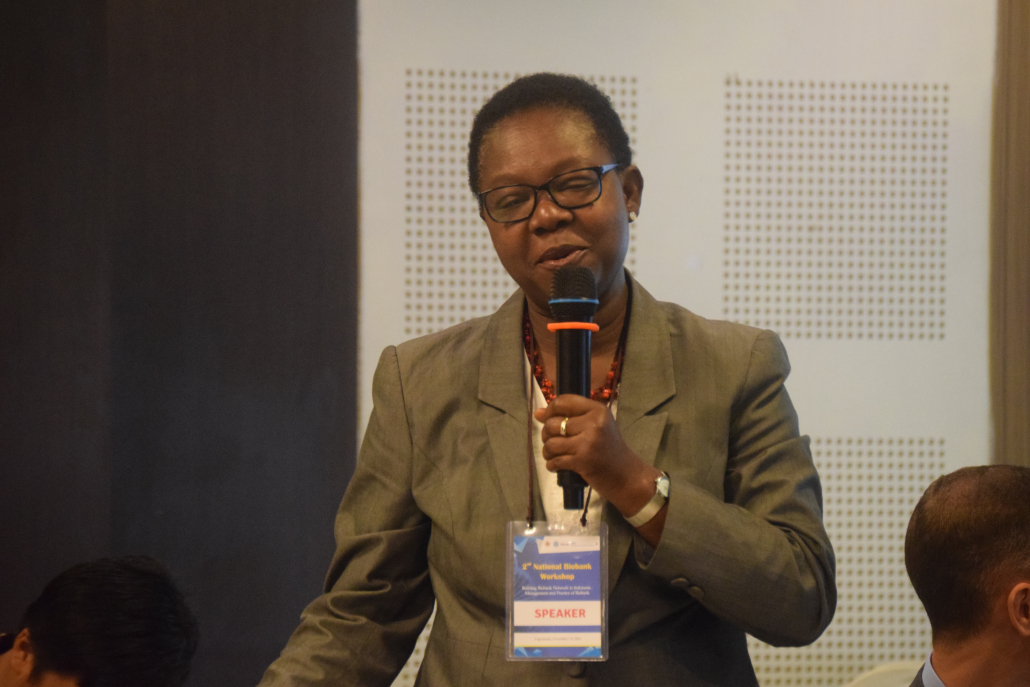
Dr. Maimuna Mendy (Head of IARC Biobank & Coordinator of BCNet WHO-IARC)
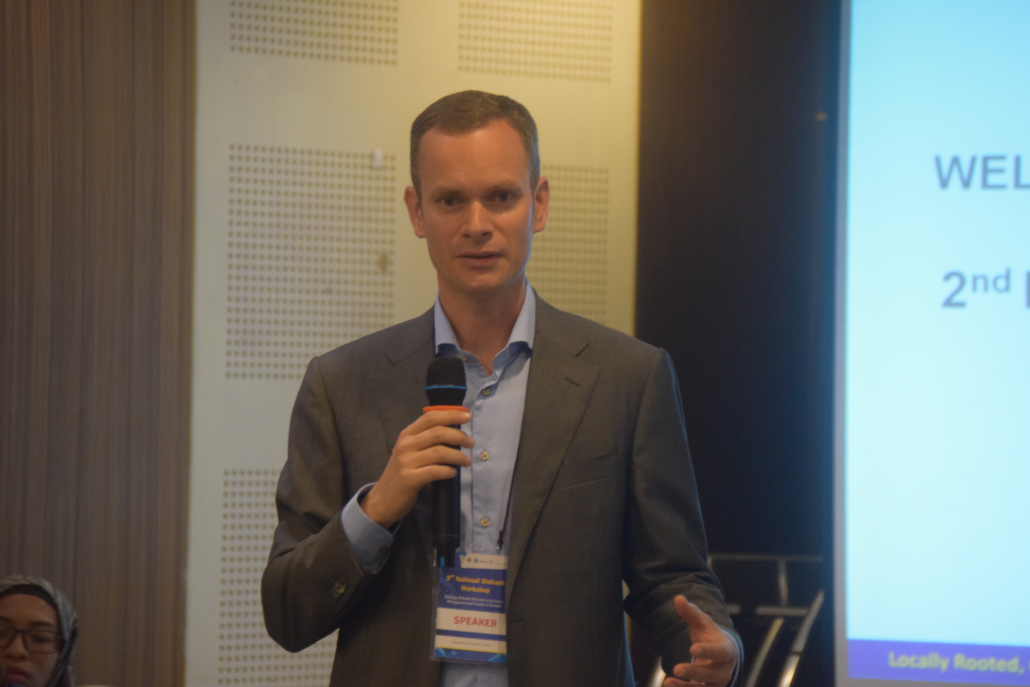
Dr Baart Scheerder (Technical Manager of Biobank UMCG, The Netherlands/Lifelines)
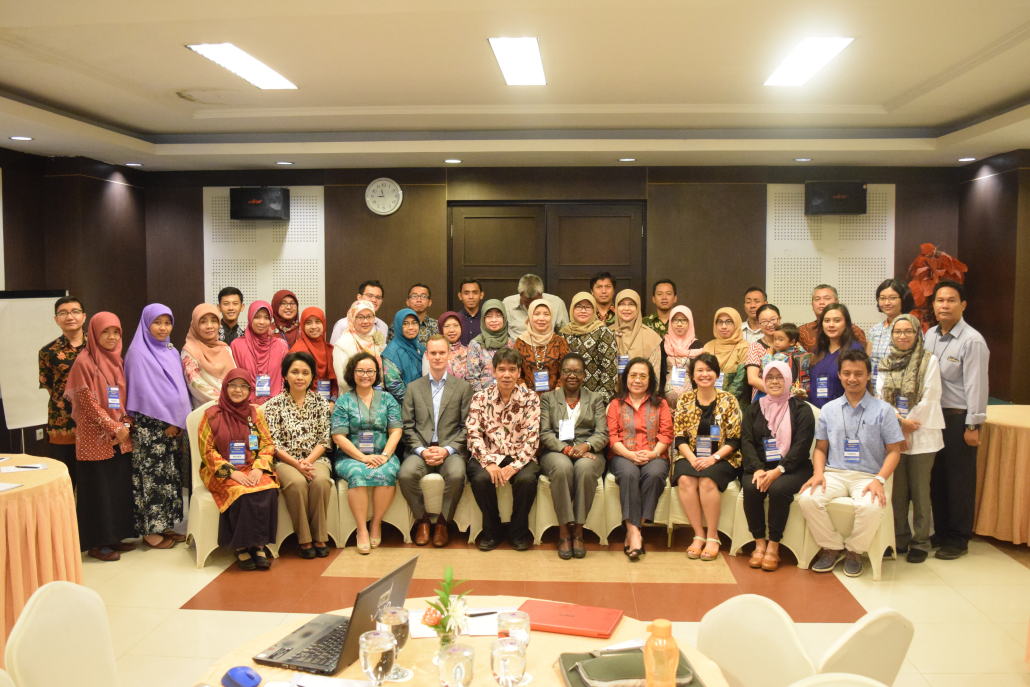
2nd National Biobank Workshop Participants
Workshop of Tissue Banking in Hospitals
This workshop was held on 9 November 2016 at FMPHN UGM. In the activity, the processing and storage of biosamples in the Department of Anatomical Pathology (UMCG), legal ethical aspects in tissue banks, and the benefits of sharing data samples for research collaboration were discussed. This workshop invited Dr. Baart Scheeder (Technical manager UMCG/Lifelines Groningen, Netherlands).
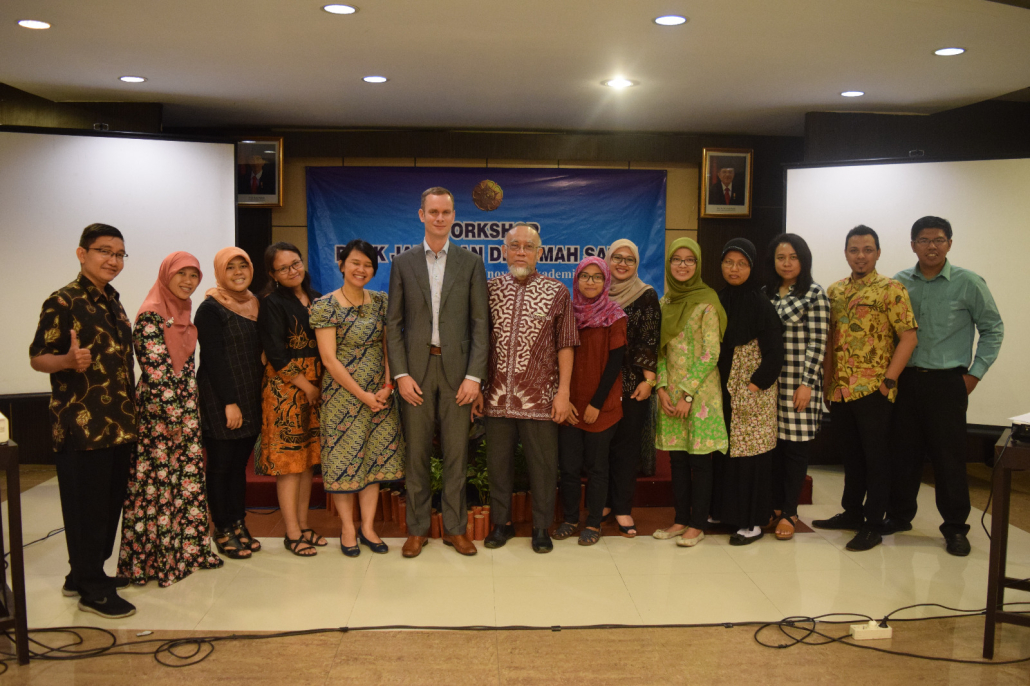
Tissue Bank Workshop Participants
Biobank System (Network) Initiation Workshop
This workshop was held on 16 November 2016 at FMPHN UGM with the aim of initiating collaboration between the three institutions (FMPHN UGM, Sardjito Hospital, and UGM Academic Hopsital). The activities discussed ethical, legal and infrastructure issues, long-term storage of the three institutions, discussion of steps to be taken to develop a joint system.
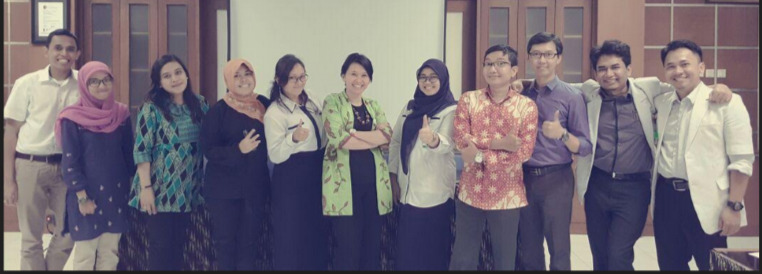
Network Initiation Workshop Participants
Development of Collaboration with Sardjito Hospital and UGM Academic Hospital
Continuing the results of the first and second national biobank workshops, the biobank team developed a collaboration with Sarjito Hospital and UGM Academic Hospital to have an integrated and international standard biobank unit. Obtained a roadmap and detailed long-term plan for 5 years (2017-2021).
ISBER 2016
International Society of Biological and Environmental Repositories (ISBER) 2016: Breaking Down Walls: Unifying Biobanking Communities to Secure Our Sustainability was held on April 5-8 in Berlin, Germany. At this event, Jajah Fachiroh, S.P., M.Si, Ph.D presented Retrospective Modeling to Build Biobank System at Gadjah Mada University, Indonesia.
2015
Modeling: Retrospective Cancer-Related Samples Physical Samples Collection
This modeling obtained 12 projects with 12,298 samples and created general policies and SOPs. In this project there was an addition to the core team, namely Sunandar Hariyanto, S.T., M.Eng as Programmer and F. Linda Tri P., AMAK as laboratory technician.
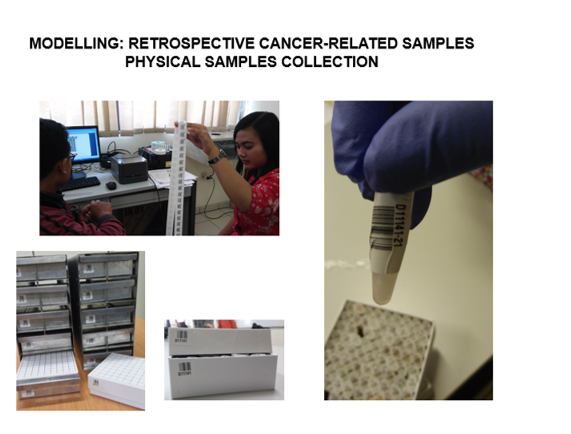
1st National Biobank Workshop
The National Biobank Workshop was first held at FMPHN UGM Yogyakarta by inviting network resource persons, namely Dr. Maimuna Mendy (Head of IARC Biobank & Coordinator of BCNet WHO-IARC) and Dr Baart Scheerder (Technical Manager of Biobank UMCG, The Netherlands/Lifelines). The workshop was held for 3 days (4-6 December 2015) with the theme “Building Biobank Network in Indonesia: Opportunity and Challenge”.
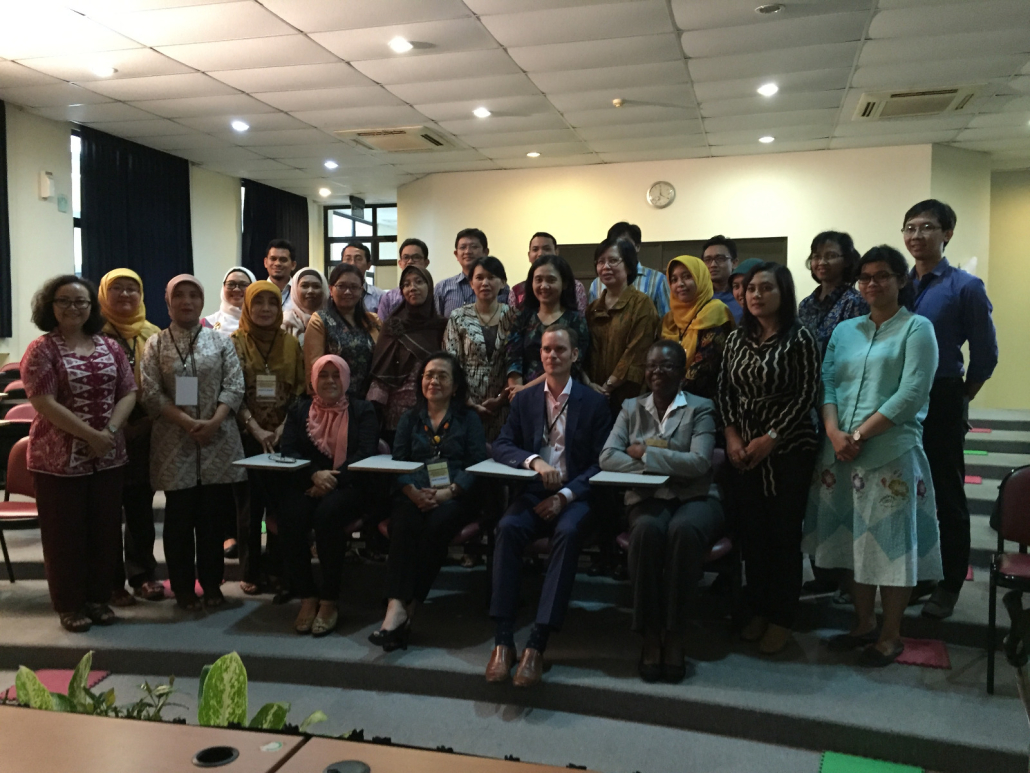
1st National Biobank Workshop Participants
